Do you struggle to find hands-on, developmentally appropriate ways to teach early math concepts? Are you concerned that your child might fall behind without the right foundation before formal schooling begins? For many parents and educators, it’s challenging to identify math activities for preschoolers that are both fun and educational.
The good news is, math doesn’t have to feel like a chore. With the right blend of creativity and intentionality, preschoolers’ math activities can become exciting learning adventures. Children can develop key mathematical skills while having fun through playful sensory exploration, counting games, and shape challenges. These strategies spark joy and build a solid math foundation that sets your child up for future academic success.
In this article, we’ve compiled 52 fun, research-backed math activities for preschoolers designed to make early math learning joyful, practical, and engaging. Whether you’re a parent at home, a teacher in a classroom, or a caregiver looking for fresh inspiration, you’ll find activities tailored to every type of learner and setting. Ready to turn everyday moments into powerful math lessons?
The Benefits of Math Activities for Preschoolers

- Building a Strong Foundation for Future Learning
At first glance, a preschooler’s interaction with numbers may seem like simple play, but it’s far more impactful. Learning to count, recognize shapes, or match objects based on size and color forms the bedrock for later academic success. These early math counting activities for preschoolers are about memorization and developing logic and abstract thinking. As preschoolers engage with math activities, they begin to make connections in their minds, setting the stage for more complex tasks like addition, subtraction, and algebraic reasoning. - Enhancing Cognitive Development
Preschoolers working with numbers or solving puzzles engage in mental exercises that build memory and concentration. Their cognitive abilities are strengthened by matching shapes or figuring out how many blocks fit together. Studies show that early math knowledge has a lasting impact on children’s brain development. For instance, by using objects to represent numbers, children can better understand abstract ideas like quantity and comparison. As they explore these concepts, they train their brains to think more systematically. - Promoting Social-Emotional Skills
Solving math problems and working on projects with peers often requires communication, cooperation, and patience. As children take turns, share resources, or collaborate on building shapes or sorting objects, they’re learning math and how to work as part of a team. Additionally, facing math challenges builds perseverance and confidence. When children complete a counting task or recognize a shape, they gain a sense of accomplishment, which boosts their self-esteem. - Strengthening Problem-Solving and Critical Thinking Skills
Math and science activities for preschoolers foster essential skills like problem-solving and logical reasoning. Preschoolers might not be aware of it, but when they ask questions like “What happens if I add one more block?” or “Which shape fits into this puzzle?” they’re developing the ability to reason, hypothesize, and explore multiple solutions. Introducing math concepts early in life encourages children to see problems from different angles and helps them understand cause-and-effect relationships. These skills extend beyond math and influence how children approach challenges in other areas. - Fostering Early Literacy Skills
When preschoolers engage in math activities, they encounter new vocabulary words like “more,” “less,” “equal,” or “addition.” These words help build their understanding of language in the context of numbers and shapes. Furthermore, understanding math symbols (like the “+” sign or the number “3”) also enhances their overall literacy and language comprehension skills. Research shows that children exposed to math activities from an early age are more likely to develop stronger reading skills. Integrating math activities for preschoolers’ lesson plans fosters a balanced development of both cognitive domains.
Mathematical Concepts in Early Childhood Education
To design practical math activities for preschoolers, it’s essential to understand what mathematical concepts are developmentally appropriate. Preschoolers don’t learn math through equations or formal instruction—they discover it through play, exploration, and interaction. These early encounters with math are critical, and they build the foundation for future problem-solving, logical thinking, and number fluency.
Here are the primary mathematical concepts commonly targeted in early learning:
- Number Sense: Understanding numbers, counting objects, recognizing numerals, and grasping the concept of quantity.
- One-to-One Correspondence: Matching one object to one number while counting helps children develop accurate counting skills.
- Patterns and Sequencing: Recognizing and creating repeating patterns with colors, shapes, or objects helps build logical thinking.
- Sorting and Classifying: Grouping items based on attributes like color, size, or type to develop categorization skills.
- Measurement: Exploring concepts like length, height, weight, and volume using informal tools such as hands, blocks, or cups.
- Geometry and Spatial Awareness: Identifying shapes and understanding concepts like over, under, near, far, beside, and between.
- Comparison: Understanding terms like more/less, bigger/smaller, taller/shorter to compare objects or quantities.
- Estimation: Making thoughtful guesses about quantity or size and checking for accuracy.
- Data Collection and Representation: Using charts, graphs, or tally marks to collect and organize simple data sets.
- Problem Solving and Reasoning: Using logic and trial-and-error to find solutions during play or structured math activities.
Building Early Math Skills: 15 Fun Activities for Preschoolers
Engaging preschoolers in math activities offers numerous cognitive, social, and emotional benefits that can set the stage for a strong mathematical foundation later in life. Early math activities for preschoolers teach specific skills like counting, sorting, and measuring, and they also foster overall cognitive development and improve problem-solving abilities.
1. Counting and Sorting with Everyday Objects
Preschoolers are naturally curious and love exploring the world around them. Using everyday objects is one of the simplest and most effective ways to introduce math concepts. Start by selecting various objects you can easily find around the house. These could be toys, kitchen items, or natural objects like rocks and leaves. You can make it more interesting by asking them to sort the items into categories, like size, color, or shape. For example, you could sort buttons by color, or apples by size.
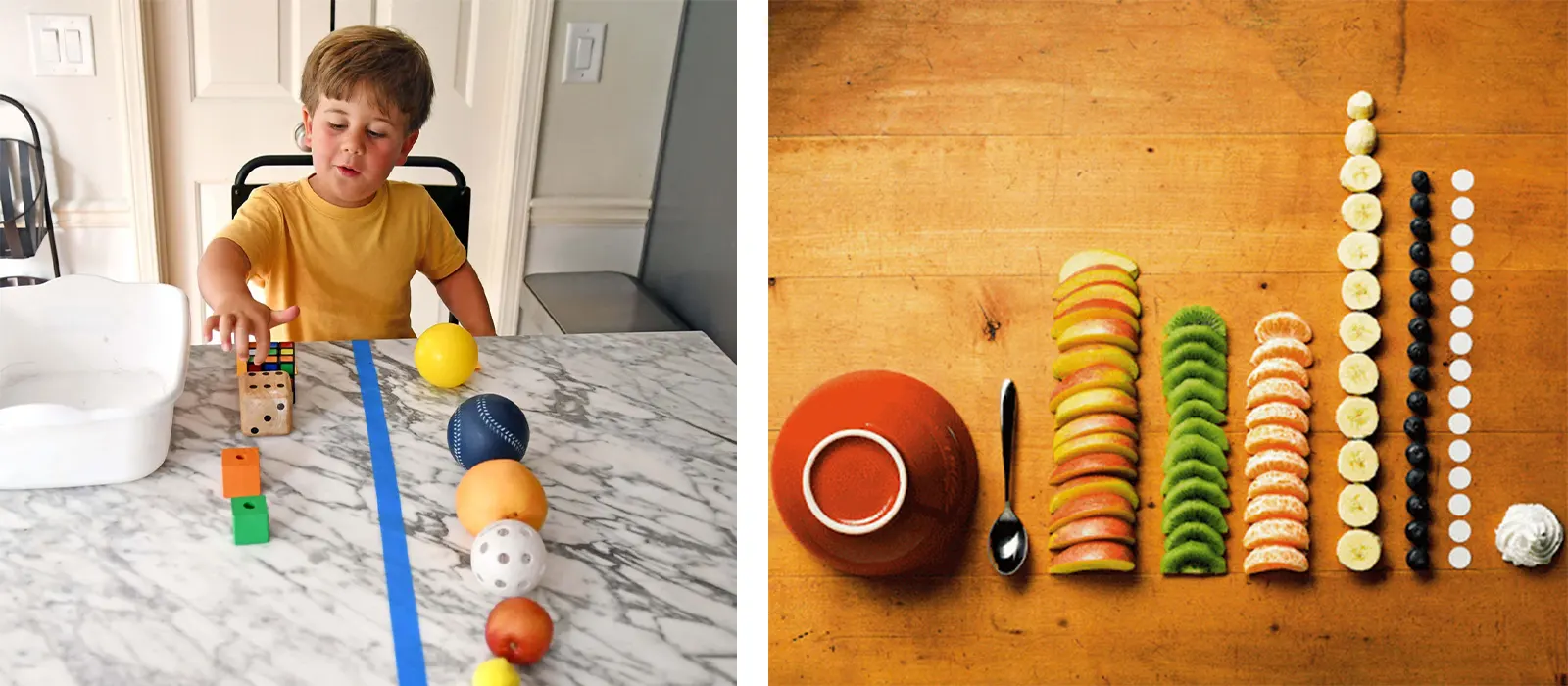
Educational Value: This activity builds foundational math skills by helping preschoolers understand number sense, categorization, and one-to-one correspondence. Counting objects reinforces the concept that numbers represent quantities, while sorting develops logical thinking and problem-solving abilities. Using familiar, hands-on materials makes learning more meaningful and helps children connect math to real-life situations.
2. Shape Hunt Around the House
Shapes are one of the first concepts preschoolers learn in early math. The “Shape Hunt Around the House” activity turns the whole home into a learning environment, encouraging kids to identify and name shapes in their surroundings. Take a walk around your house with your child and look for common shapes. You can make it a game by asking your child to point out different shapes—squares, circles, triangles, rectangles, and more. For an added challenge, try to find 3D shapes like cubes, cones, and spheres.
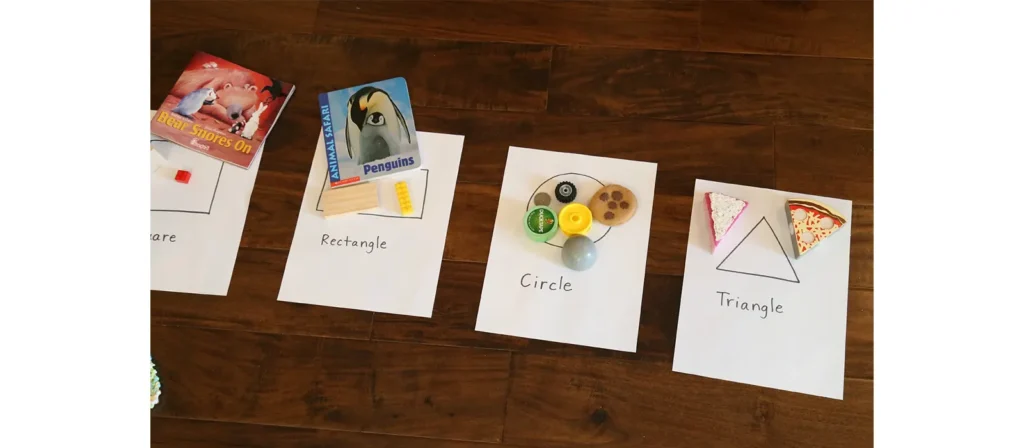
Educational Value: Recognizing shapes helps preschoolers develop spatial awareness. It also strengthens their ability to categorize and compare objects, foundational math skills. This math activity can also introduce the concept of symmetry and angles, which will help as they progress to more advanced math concepts.
3. Building Towers with Blocks
Building towers with blocks is a great way to introduce preschoolers to concepts of balance, height, and even simple addition and subtraction. Use blocks, Lego pieces, or any stackable objects. Encourage your child to build towers, then compare them in height. You can count the blocks in each tower and ask them to add or remove blocks to create taller or shorter towers.
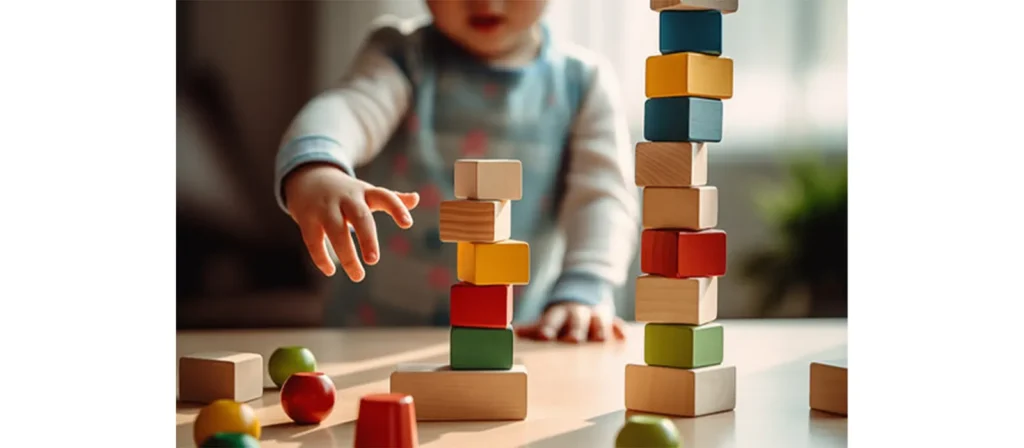
Educational Value: These math activities for preschoolers promote fine motor skills and help children understand the concept of measurement, balance, and weight. Additionally, counting the blocks introduces early arithmetic skills, and comparing towers fosters an understanding of bigger and smaller.
Don’t just dream it, design it! Let’s chat about your custom furniture needs!
4. Math Scavenger Hunt
A scavenger hunt is an excellent way to combine problem-solving, movement, and math into a fun activity. By giving your preschooler a list of math-related items to find, you can reinforce important concepts. Create a list of math-related items for your child to find around the house. For example, you might ask them to find something that is a certain color (like a red ball), something that is a specific shape (such as a square picture frame), or something that can be counted (like three books). Make sure the items align with the math concepts you want to reinforce.
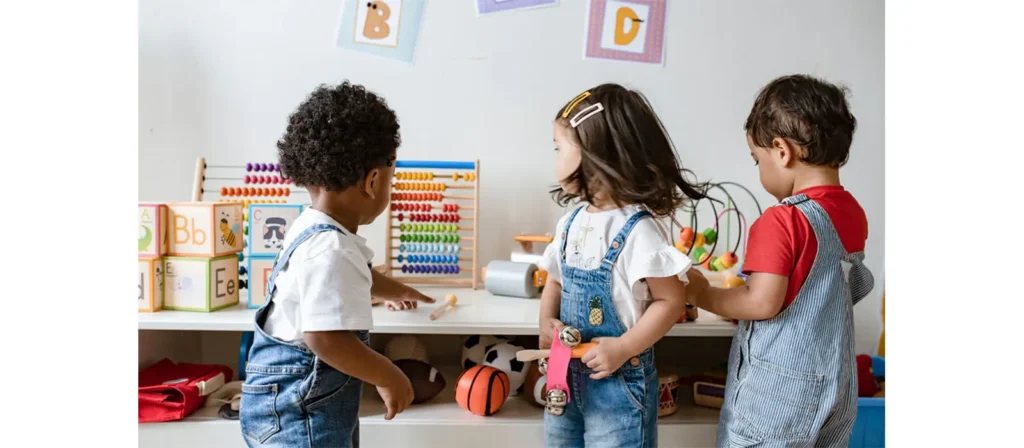
Educational Value: A scavenger hunt introduces math concepts in a real-world context. It promotes problem-solving and reasoning, as children figure out how to identify the objects based on your clues. Additionally, it’s a great way to engage them in learning while moving around and exploring.
5. Matching Numbers to Quantities
Matching numbers to quantities is an important early math skill that helps preschoolers develop number sense. This math activity helps them understand the relationship between a numeral and its corresponding quantity. Use flashcards with numbers on them, or create your own cards. Place a set of small objects, like coins or buttons, in front of your child. Ask them to match the number on the card with the correct quantity of objects. For example, show them the number 3, and ask them to pick out three blocks from a pile.
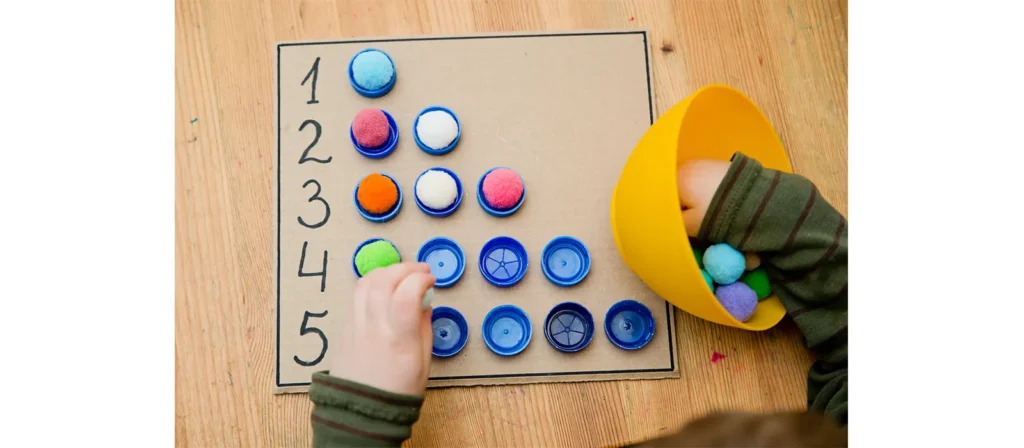
Educational Value: This math activity reinforces counting and number recognition. It also helps preschoolers understand the concept of one-to-one correspondence, which is crucial for more advanced math operations like addition and subtraction.
6. Shape and Color Sorting with Puzzles
Puzzles are excellent for cognitive development and offer a great opportunity to practice sorting shapes and colors. Provide your child with a variety of puzzles that involve sorting pieces by shape or color. For example, you can use shape-based puzzles where each piece fits into a corresponding space, or you can give them a set of colored objects and ask them to sort them into color-coded groups.
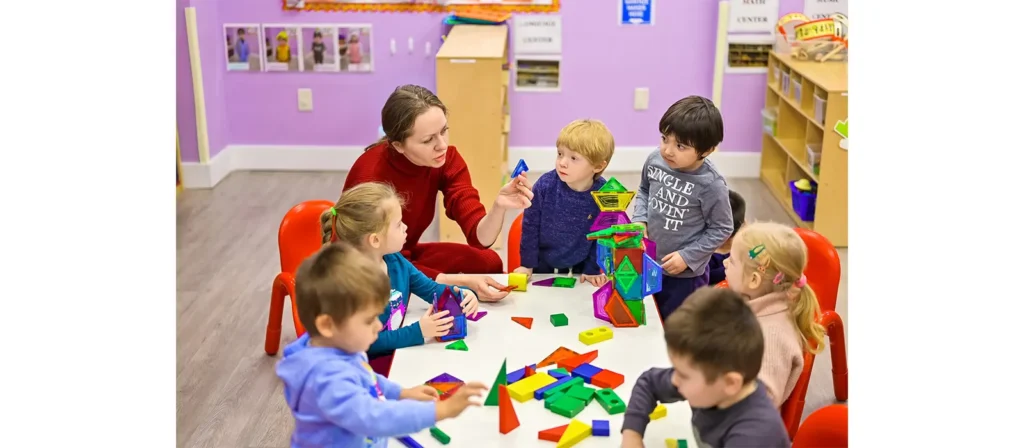
Educational Value: Sorting puzzles help preschoolers develop their problem-solving and logical thinking skills. It also reinforces shape and color recognition and categorization skills that are foundational for math and science learning.
Don’t just dream it, design it! Let’s chat about your custom furniture needs!
7. Measurement with Non-standard Units
Introducing measurement to preschoolers can be fun and easy with non-standard units, such as blocks, paperclips, or even their own hands and feet. Ask your child to measure the length of different objects using non-standard units. For example, they can use blocks to measure the length of a table or their shoes to measure the height of a door. The idea is to measure things using items they can easily relate to and understand.
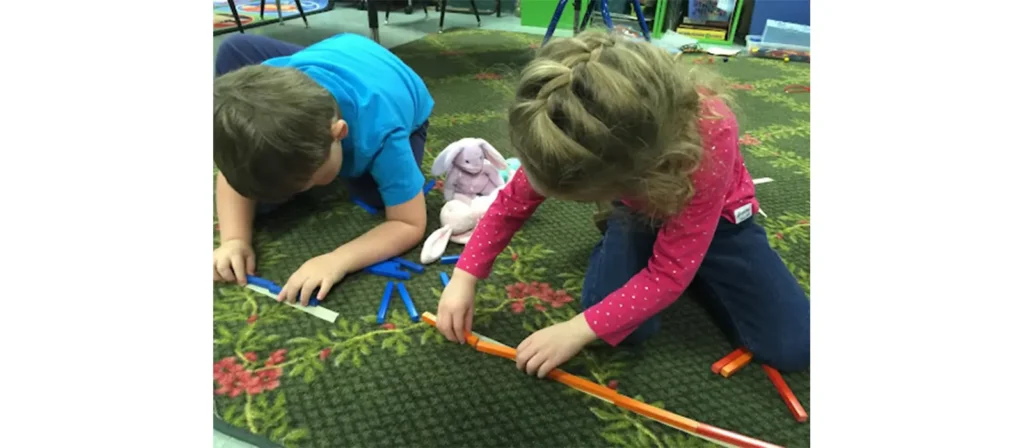
Educational Value: These math activities for preschoolers introduce the concept of measurement and comparison. It also helps children understand the idea of size, length, and volume. As they measure various objects, they begin to grasp fundamental math concepts that will prepare them for using standard units later.
8. Guess My Number
Guessing numbers is a fun way to develop number recognition and logical thinking. This game can be played with a simple set of flashcards or even with numbers drawn on a whiteboard. Choose a number between 1 and 10 (or higher, depending on your child’s abilities). Ask your child to guess the number by giving clues. For example, you can say, “I am thinking of a number greater than 5 but less than 8,” or “I am thinking of a number that is one less than 4.”
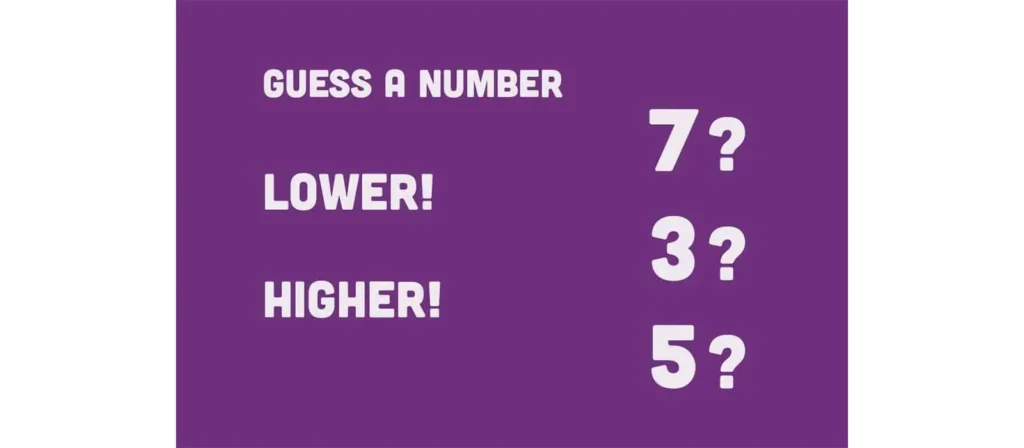
Educational Value: This math activity reinforces number recognition and also encourages logical reasoning. By providing clues, children learn to think critically about numbers and their relationships to one another.
9. Math Bingo
Math Bingo is a fun and engaging way to practice numbers and basic math skills like addition and subtraction. Create Bingo cards with numbers or simple math problems. Call out the answers or numbers, and ask your child to mark them on their card. You can make the game more challenging by incorporating simple addition or subtraction problems that your child needs to solve to fill out their Bingo card.
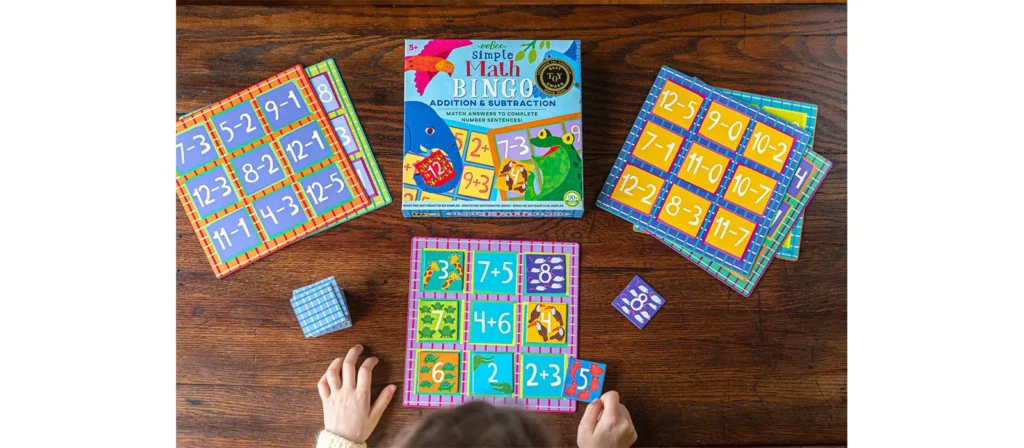
Educational Value: Math Bingo reinforces number recognition, counting, and basic arithmetic in a playful environment. The game format also adds an element of excitement and encourages children to stay focused and engaged.
Don’t just dream it, design it! Let’s chat about your custom furniture needs!
10. Estimate and Count
Estimation is a key skill that preschoolers can practice early on. Estimating how many items are in a jar helps develop their number sense and ability to approximate quantities. Fill a jar with small objects—buttons, coins, or marbles—and ask your child to estimate how many items are inside. After they make their guess, allow them to count the items to see how close they were. You can make the activity more challenging by changing the objects’ size or the jar’s number.

Educational Value: This math activity for preschoolers introduces the concept of estimation, an important math skill. It also reinforces counting and comparing quantities, helping preschoolers better understand numbers and their relationships.
11. Heaviest Book in the Room
This math activity introduces children to weight and comparison, helping them develop early measurement skills. Start by collecting books of different sizes and shapes from around the house. Ask your child to guess which book is the heaviest and lightest. Once they’ve made their predictions, show them how to test their guesses by holding each book in their hands and comparing the weight. If you have a kitchen scale, you can weigh the books to see if their estimates were correct.

Educational Value: This activity strengthens critical thinking and problem-solving skills by encouraging children to make predictions and test them. It also introduces them to concepts of weight and measurement hands-on.
12. Sticks and Stones
Outdoor math activities like “Sticks and Stones” provide an excellent opportunity to combine nature exploration with math learning. Take your child outside to collect small sticks, stones, or other natural objects. Once you’ve gathered a collection, ask your child to sort them into categories based on size, shape, or type. They can also use the objects to create patterns or count how many they have in each group. Introduce simple addition and subtraction problems using the collected items for an added challenge.
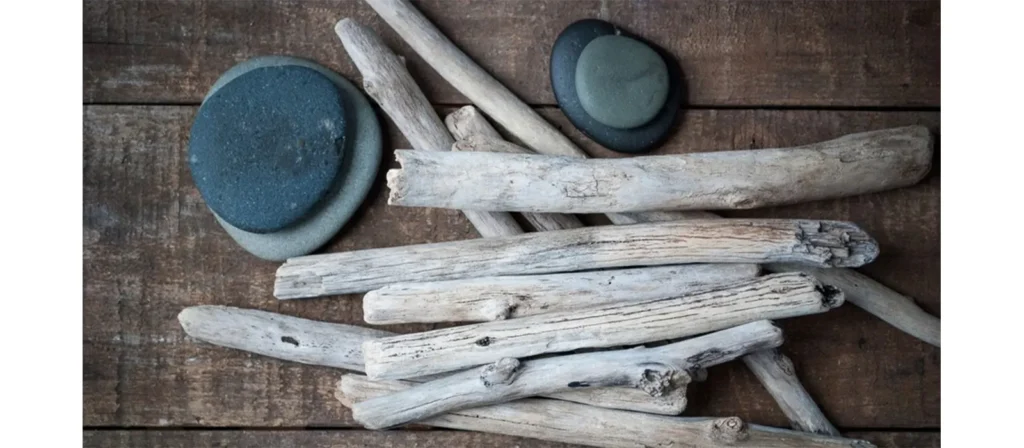
Educational Value: These math activities for preschoolers encourage categorization, counting, and pattern recognition. They also incorporate sensory play and connect children to nature, making learning more dynamic and engaging.
13. Fishing for Numbers
Fishing for Numbers is a playful way to practice number recognition and counting. Cut out fish shapes from colored paper and write numbers on them. Attach a paperclip to each fish and create a “fishing rod” using a stick, string, and magnet. Scatter the fish on the floor or in a shallow box and ask your child to “fish” for specific numbers. You can also incorporate math problems, such as asking them to catch the fish with numbers that add up to 10.
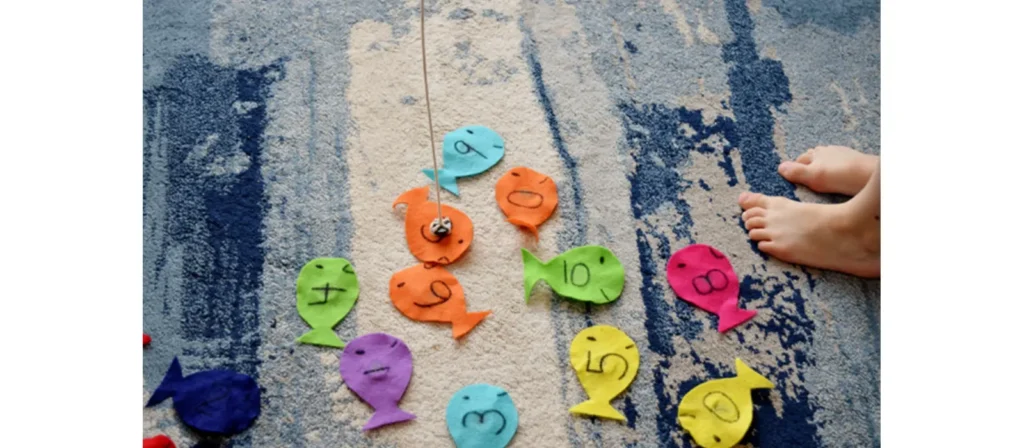
Educational Value: This activity enhances fine motor skills, number recognition, and problem-solving abilities. The interactive element keeps preschoolers engaged and excited about learning.
14. Weighing and Balancing
Introducing preschoolers to the concept of balance and weight can be both fun and educational. If you have a balance scale, demonstrate how to place objects on each side and observe which side is heavier or lighter. If you don’t have a scale, you can create a simple one using a hanger, string, and small containers. Ask your child to compare the weights of various objects, such as toys, fruits, or household items. You can also challenge them to find objects that weigh the same.

Educational Value: This activity teaches the concepts of balance, weight, and comparison. It also encourages critical thinking and experimentation, as children test different objects to find those of equal weight.
15. Math Storytime
Math storytime combines literacy with math learning, helping children see how math applies to real-world situations. Choose books incorporating math concepts like counting, patterns, or shapes. Read the story with your child and pause to ask questions or solve problems together. For example, if the story involves counting animals, ask your child to count along or predict what happens next based on a pattern.
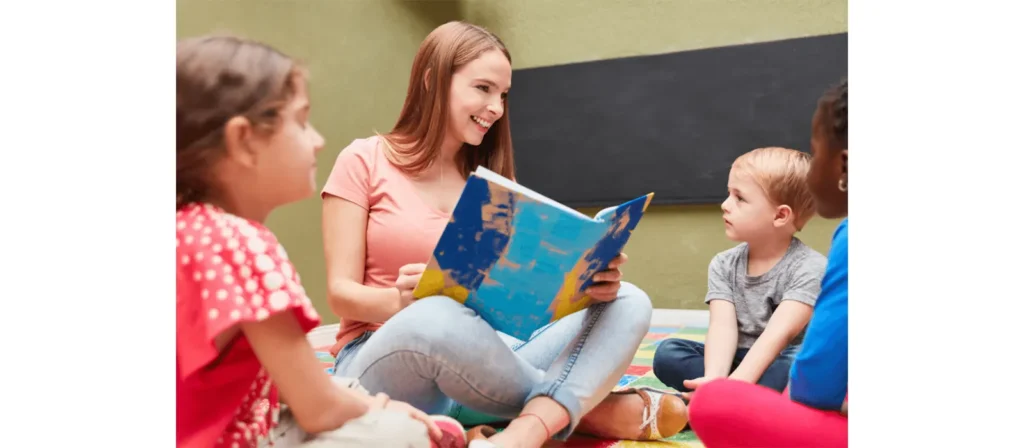
Educational Value: These math activities for preschoolers foster a love for reading and math. By integrating math into stories, children understand how numbers and patterns are part of everyday life. It also strengthens listening and comprehension skills.
16. Count and Clap Game
This is a movement-based game perfect for indoor or circle time. Start by calling out a number between 1 and 10. Ask the child to clap their hands that many times. Then reverse roles—you clap, and they count your claps aloud. Once they’re comfortable, mix it up with stomps, jumps, or finger taps. Add a musical rhythm for fun or pair it with a favorite song to keep energy high.
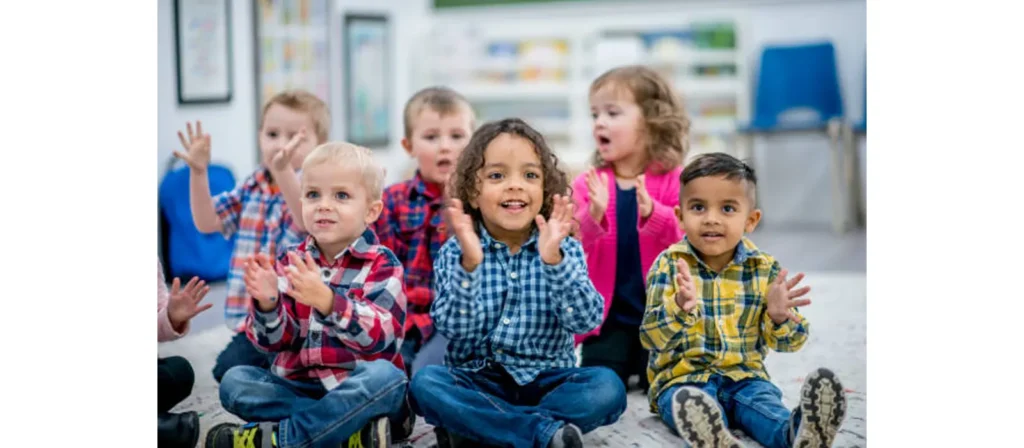
Educational Value: The count-and-clap game develops number sense and reinforces one-to-one correspondence, which is essential for accurate counting. Children also strengthen motor coordination and auditory processing by connecting numbers to physical actions.
17. Pattern Bead Necklaces
Set out colorful plastic beads and child-safe string. Begin by modeling a simple pattern (e.g., red-blue-red-blue) and narrate your thinking aloud. Invite the child to copy your pattern, then encourage them to create their own. As their skills develop, the pattern complexity increases using size, shape, or a three-color sequence. Once finished, they can wear their necklace as a fun reward!
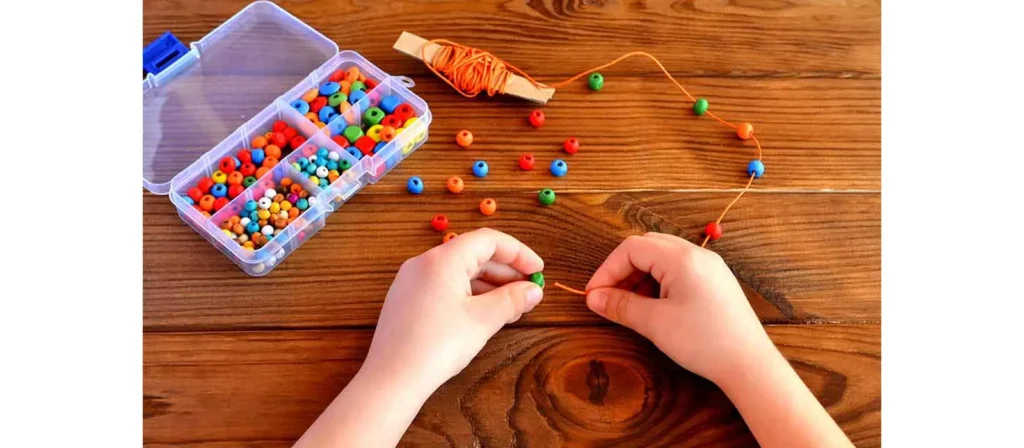
Educational Value: Beading patterns strengthen early algebraic thinking by helping children recognize and replicate sequences. The process also builds hand-eye coordination, concentration, and fine motor control while allowing for creativity.
18. Roll and Count Dice Game
Provide your preschooler with a large foam die or two standard dice. Have them roll the dice and count the number of dots shown. Then, they collect that number of small objects—like pom-poms, buttons, or blocks—and place them in a bowl or tray. You can also add a competitive twist by letting two children roll and see who collects more items.
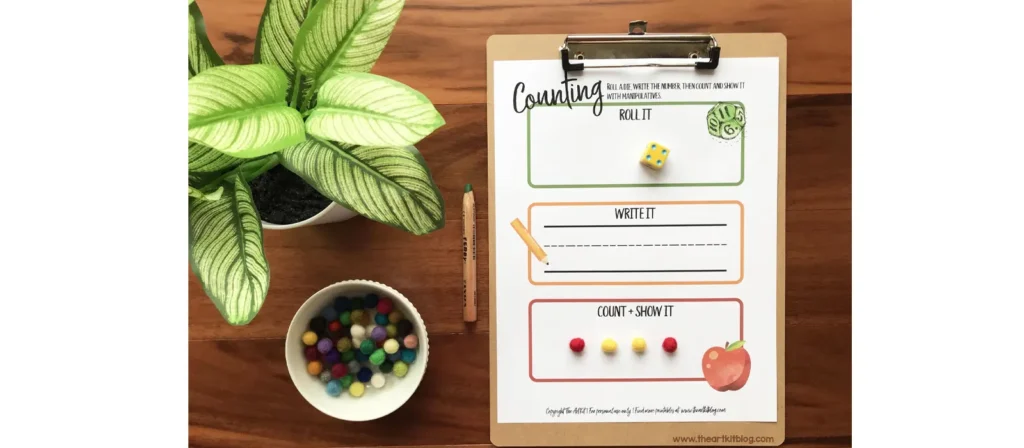
Educational Value: This dice game supports number recognition, counting accuracy, and one-to-one correspondence. It introduces children to subitizing (recognizing quantities without counting) and strengthens early math fluency through play.
19. Button Sorting Station
Set out a pile of colorful buttons in different shapes, sizes, and colors. Provide sorting trays or muffin tins and ask the child to sort the buttons based on one attribute (color, shape, or size). Once done, challenge them to try sorting the same buttons by a different attribute.
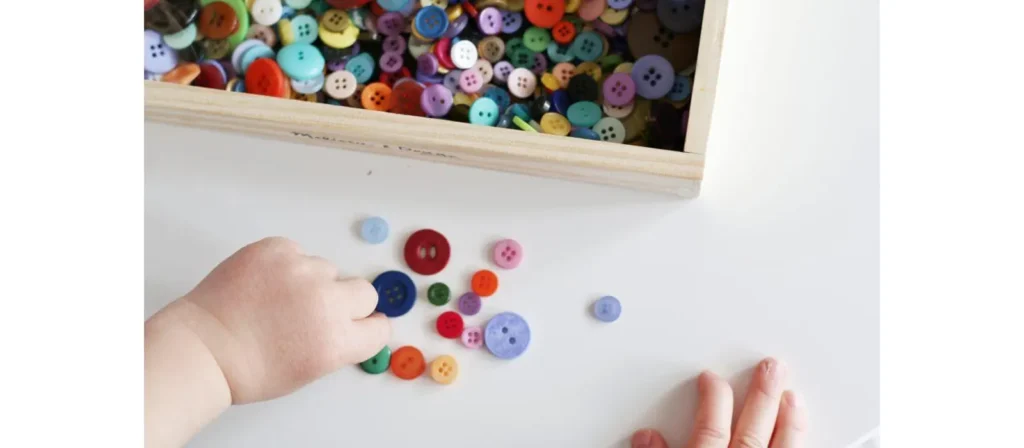
Educational Value: Sorting promotes classification and analytical thinking. It lays the groundwork for data handling and early statistics. This activity also encourages attention to detail and flexible thinking as children shift between sorting criteria.
20. Hopscotch Number Line
Create a simple hopscotch grid numbered 1 through 10 (or higher) using sidewalk chalk or masking tape. Encourage the child to toss a small beanbag onto a number and then hop to it while counting aloud. You can modify it by calling out number challenges like “Hop to number 7!” or “Hop from 3 to 5!”
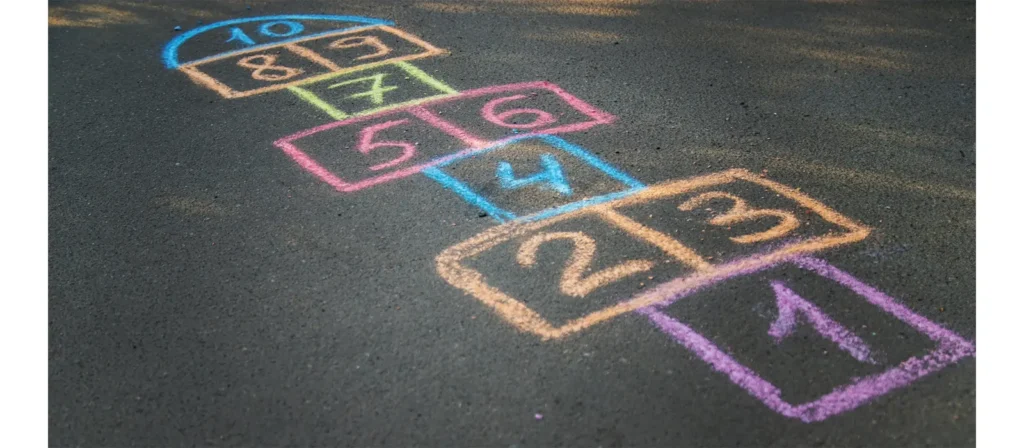
Educational Value: This physically active game builds number sequencing and recognition while integrating gross motor development. It helps children understand number order and introduces early concepts of addition and subtraction through movement.
21. Number Parking Lot
Create a large “parking lot” using cardboard or a printable mat with numbered spaces (1–10 or 1–20). Label toy cars with corresponding numbers on sticky notes or tape. Ask the child to match the numbered cars to the correct parking space. You can expand the game by calling out numbers randomly or adding simple math clues like “Park the car that’s one more than 4.”
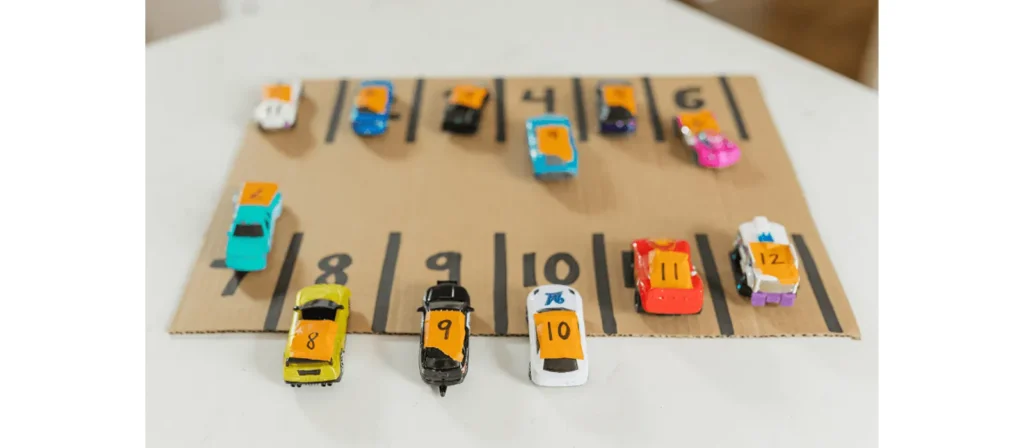
Educational Value: This engaging matching game reinforces number recognition, sequencing, and problem-solving. It provides a visual and tactile way to understand number placement, while incorporating movement and imagination.
22. Domino Match-Up
Give your child a simple set of dominoes and ask them to sort or match them by dot count. They can line up dominoes with equal values, create chains of increasing numbers, or use them to build small structures. You can also make simple math sentences using the dot patterns (e.g., 3 dots + 2 dots = 5).
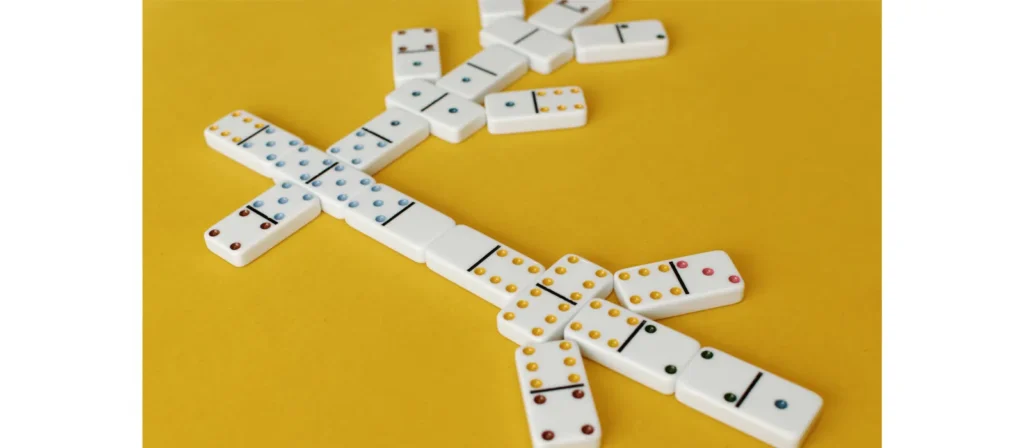
Educational Value: Dominoes support number recognition, subitizing, and addition skills. They help preschoolers visualize quantity and relationships between numbers in a concrete, hands-on way.
23. Playdough Numbers and Shapes
Provide your child with playdough and number or shape cookie cutters. Ask them to form numbers or geometric shapes using the cutters or freehand. You can also give them number cards and have them build the corresponding number of playdough balls or objects.
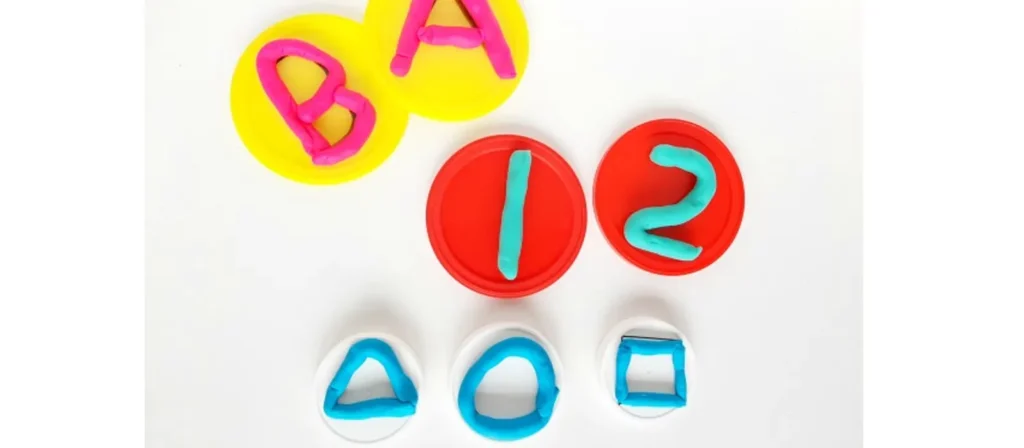
Educational Value: This multisensory activity strengthens fine motor skills while supporting number formation, shape recognition, and counting. It helps children connect tactile input to abstract math ideas, reinforcing learning through creative play.
24. Ice Cube Tray Counting
Take a clean ice cube tray and label each slot with numbers from 1 to 10 using stickers or a marker. Give your child small manipulatives like beads, buttons, or dry beans. Ask them to place the correct number of items into each slot according to the label. You can turn it into a timed game or race to complete all slots correctly.
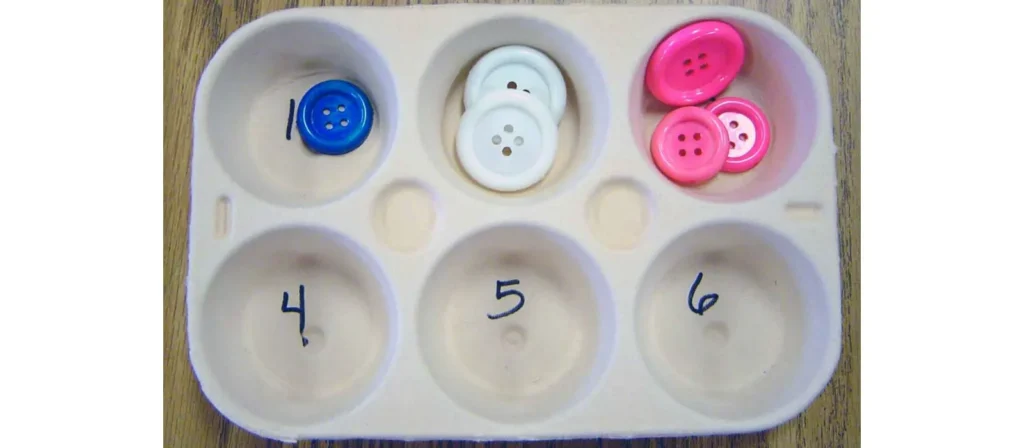
Educational Value: This hands-on activity reinforces number recognition and one-to-one correspondence. It builds fine motor coordination as children carefully place small objects and enhances number-to-quantity matching. Such math activities for preschoolers turn simple household items into powerful educational tools.
25. Water Play Volume Exploration
Set up a water table or plastic bins with cups, scoops, and containers of various sizes. Let children fill, pour, and compare how much water each container holds. Add colored water or bubbles to increase engagement, and prompt questions like “Which holds more?” or “How many small cups fill this big jug?”
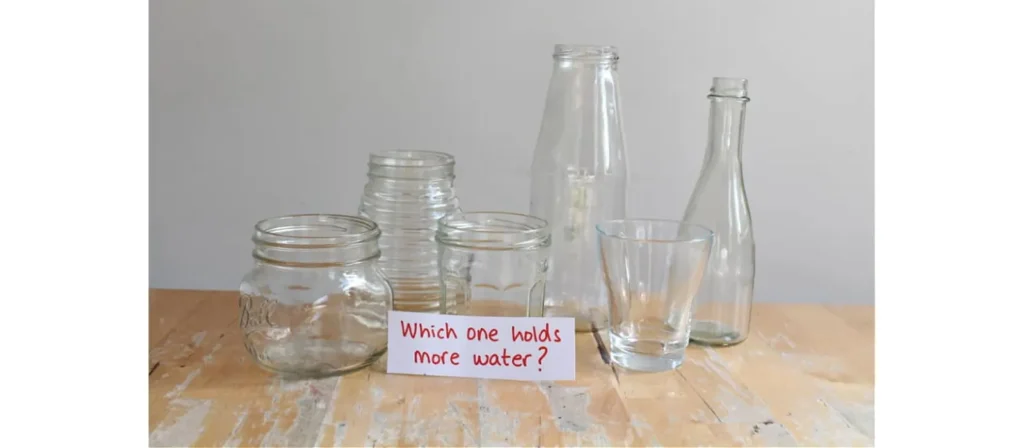
Educational Value: Water play introduces preschoolers to basic measurement concepts such as volume and capacity. It also encourages estimation, comparison, and scientific observation. These math activities for preschoolers naturally integrate sensory learning and math, building conceptual understanding through play.
26. Number Train Assembly
Draw or print out train cars labeled with numbers (1–10 or higher). Give children objects like toy animals, blocks, or stickers to “load” onto each car based on the number shown. You can also ask them to arrange the train cars in ascending or descending order to build their train track.
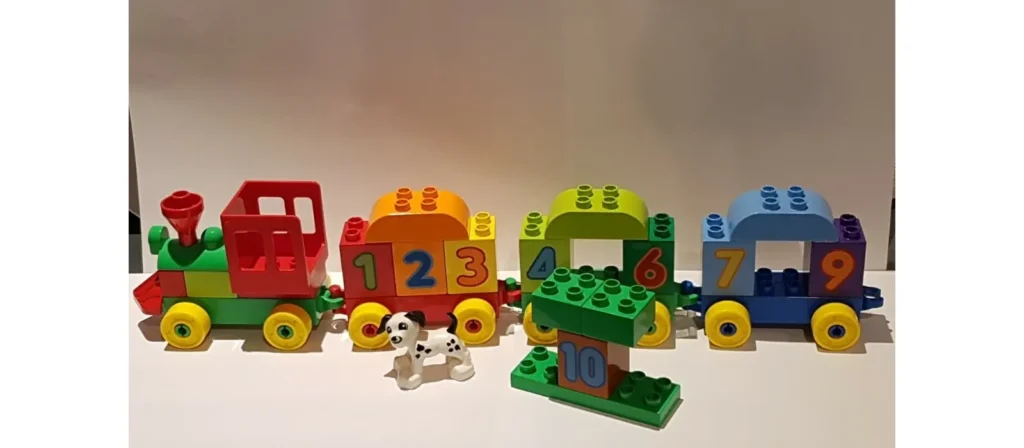
Educational Value: This activity blends number recognition with sequencing and counting. It also introduces early operations like addition or subtraction (e.g., adding passengers). As children “build” the train, they practice mathematical order and cardinality, making it a dynamic and visual math activity for preschoolers.
27. Grocery Store Math Role-Play
Set up a pretend grocery store using toy food, price tags, and play money. Assign roles—cashier, shopper, and bagger—and let your child shop using coins or tokens. They can count items, match price tags, and even “make change” with adult guidance. You can increase complexity with shopping lists and budgets.

Educational Value: Role-play introduces math in real-life scenarios, helping children grasp money concepts, counting, and value comparison. It fosters problem-solving, communication, and early financial literacy—essential elements often overlooked in traditional math activities for preschoolers.
28. Toss the Number Beanbag
Write numbers (1–10 or higher) on large paper plates or floor mats and spread them around an open space. Give your preschooler a soft beanbag and ask them to toss it onto a number. Once the beanbag lands, they must identify the number and complete an action, like clapping, jumping, or finding the exact number elsewhere in the room.
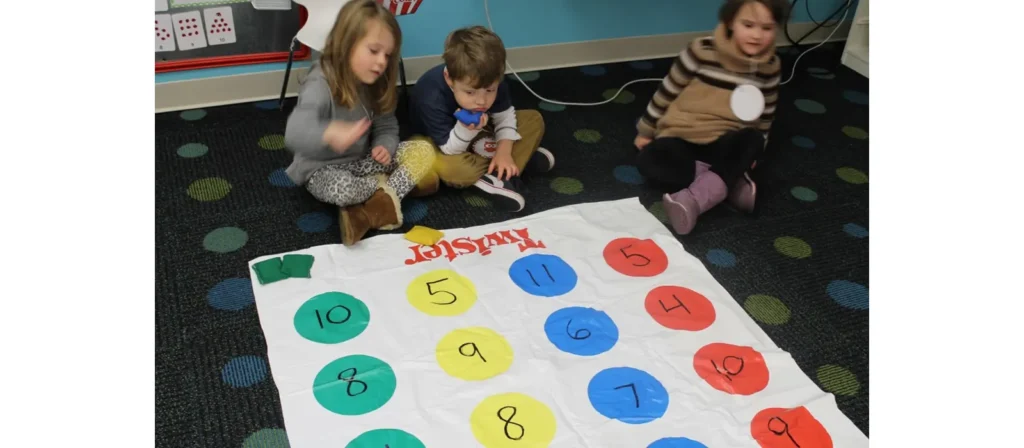
Educational Value: This gross-motor math activity strengthens number recognition, coordination, and body awareness. It engages kinesthetic learners and introduces the concept of linking physical movement with numeric value, a crucial step in abstract understanding. Among physical math activities for preschoolers, this one is ideal for energetic learners.
29. Mystery Bag Math
Fill several opaque bags with different quantities of the same object (e.g., 3 marbles, 5 blocks, 7 erasers). Without looking, the child reaches into each bag, feels the contents, and guesses how many are inside. After guessing, they open the bag and count the items to check their prediction. Discuss if the guess was higher, lower, or correct.
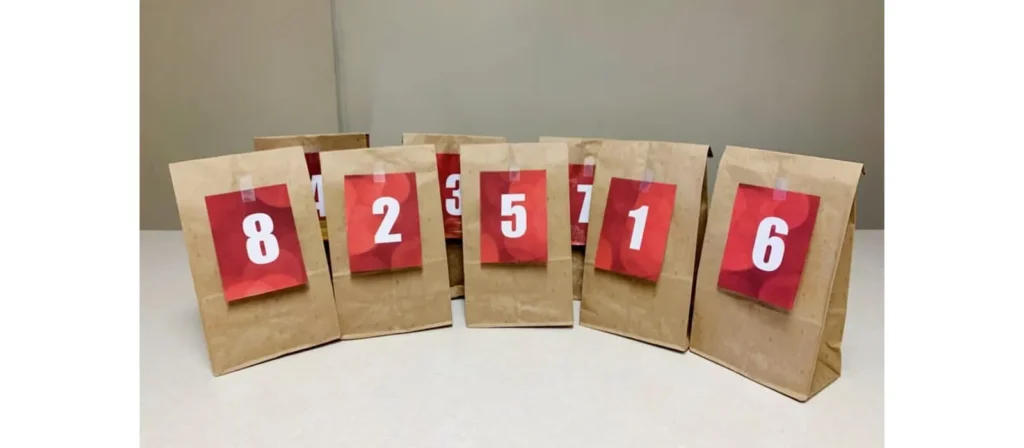
Educational Value: This tactile activity introduces estimation and number sense, enhancing a child’s intuitive understanding of quantity. It builds vocabulary around comparisons (more, less, equal) and sharpens critical thinking. As part of sensory-based math activities for preschoolers, it makes abstract math feel more concrete.
30. Shape Construction with Craft Sticks
Give your child colored craft sticks and a reference chart or flashcards of simple shapes. Encourage them to build each shape by laying the sticks on a flat surface—triangles, squares, rectangles, and even complex shapes like trapezoids. Challenge them to create larger shapes using multiple smaller ones.

Educational Value: This activity develops spatial awareness, geometry, and problem-solving skills. It encourages understanding sides, angles, and symmetry—all essential early math concepts. Shape construction promotes fine motor and cognitive development for preschoolers in a creative and tactile math activity.
31. Count the Sound Game
Use a shaker, bell, drum, or even your hands to create a series of sounds (e.g., three drumbeats or five claps). Ask the child to listen carefully and count how many times the sound occurs, then show the number using fingers or by placing objects on a table. You can increase difficulty by mixing fast and slow rhythms.
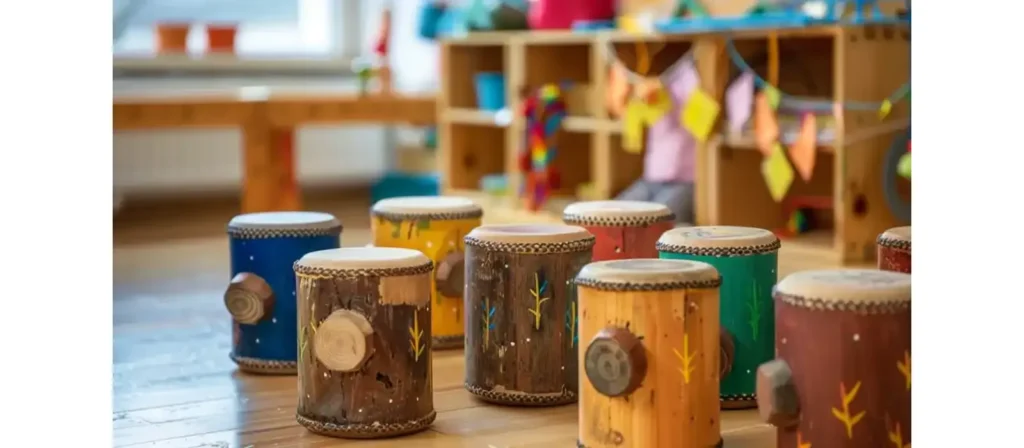
Educational Value: This auditory-based game strengthens listening skills, auditory processing, and number comprehension. It’s particularly beneficial for auditory learners and supports accurate counting through sound, a unique approach within math activities for preschoolers that blends music and math.
32. Paper Plate Clock for Number Order
Create a paper plate clock by writing numbers 1–12 around the edge like a real clock face. Have your preschooler place movable hands (cut from cardboard) at different numbers as you call them out. You can also ask them to arrange number tiles in order around a blank plate to reinforce sequencing.
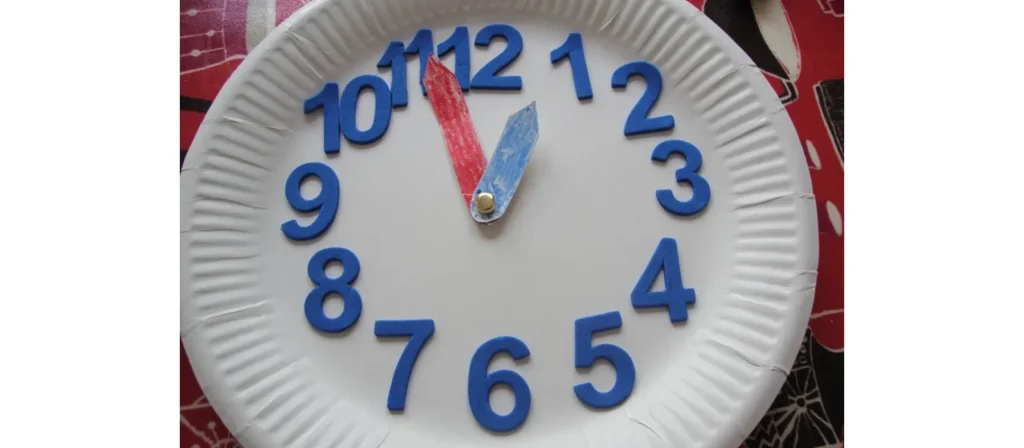
Educational Value: This activity introduces number sequencing and early time-telling concepts. While young children may not grasp full clock reading, they gain valuable exposure to number placement and circular order, supporting math and future time literacy. It’s a foundational addition to advanced math activities for preschoolers.
33. Shape Stamping Art
Provide your child with sponge stamps or blocks shaped like circles, squares, triangles, rectangles, paint, and large sheets of paper. Encourage them to dip the shapes in paint and create a picture or pattern using the stamps. You can guide them to make repeating patterns, identify the number of each shape used, or group similar shapes together afterward.
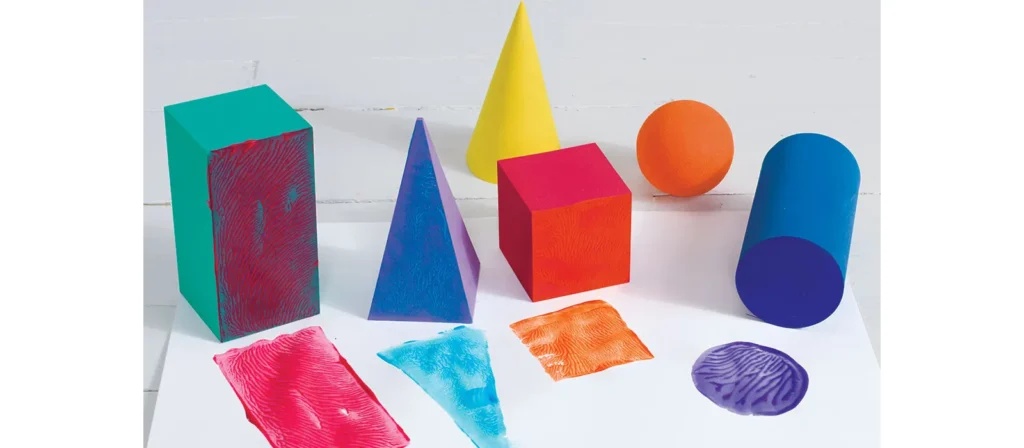
Educational Value: This activity blends creative expression with geometry recognition. As children use and compare shapes, they strengthen their understanding of form, symmetry, and categorization. It also develops fine motor skills and visual-spatial reasoning, making math learning artistic and concrete.
34. Count and Stack Cup Tower
Give your preschooler a set of paper or plastic cups and number them from 1 to 10. Challenge them to stack the cups in order, starting with 1 at the bottom and building up to 10. Then, ask them to reverse the order. For variety, place a specific number of small objects inside each cup before stacking.
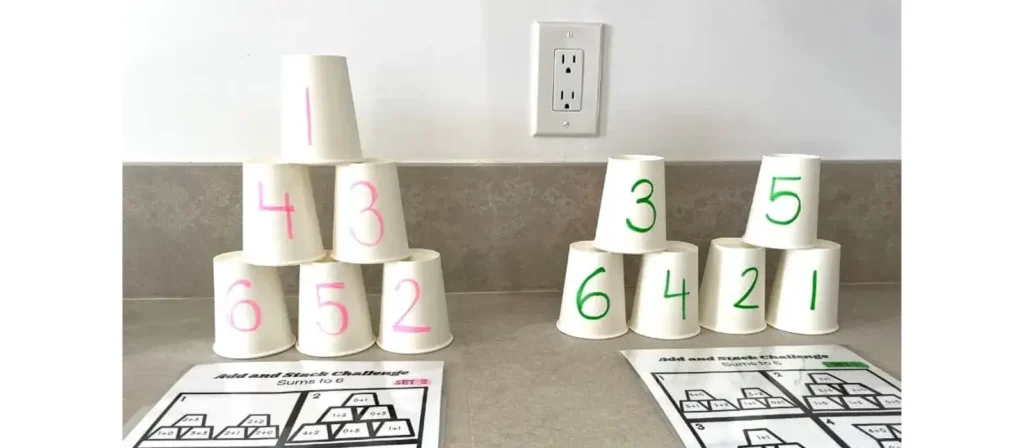
Educational Value: This activity enhances understanding of number order and quantity association. Stacking also introduces balance and sequencing concepts. As they build and reconfigure, children engage in hands-on math exploration that encourages persistence and logical thinking.
35. Nature Math Walk
Go on a nature walk with your child and bring a clipboard or collection basket. Task them with finding and collecting natural objects based on quantity or attributes—like “Pick 5 leaves,” “Find 3 round rocks,” or “Gather 2 twigs longer than your finger.” Using their findings, they can sort, count, and create art or graphs at home or school.
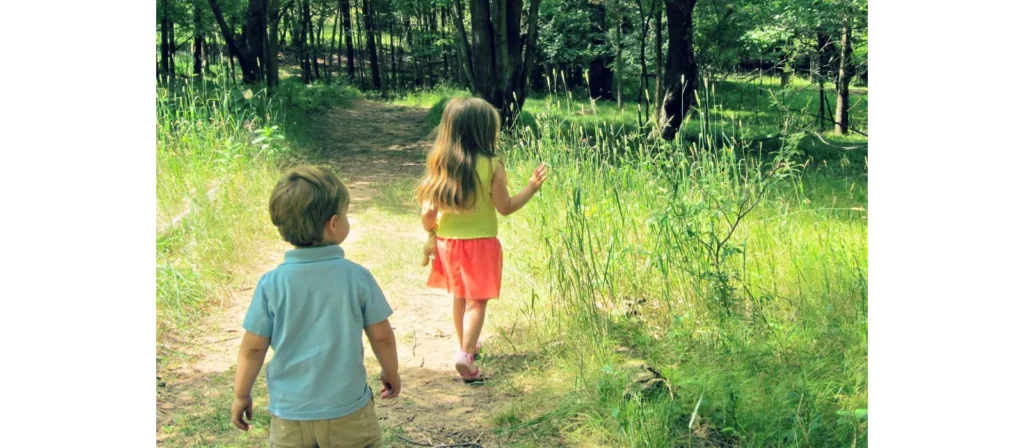
Educational Value: This outdoor activity reinforces counting, comparison, sorting, and shape recognition through real-world interaction. It encourages sensory engagement and appreciation for nature while seamlessly introducing key math skills. Physical movement combined with math inquiry strengthens retention and enthusiasm.
36. Stairs Counting Climb
Using a staircase at home or in class, label each step with numbers using sticky notes. As your child climbs up, have them count aloud with each step. On the way down, try counting backward. You can also place an object on a certain step and ask them to find “step number 6,” for example.
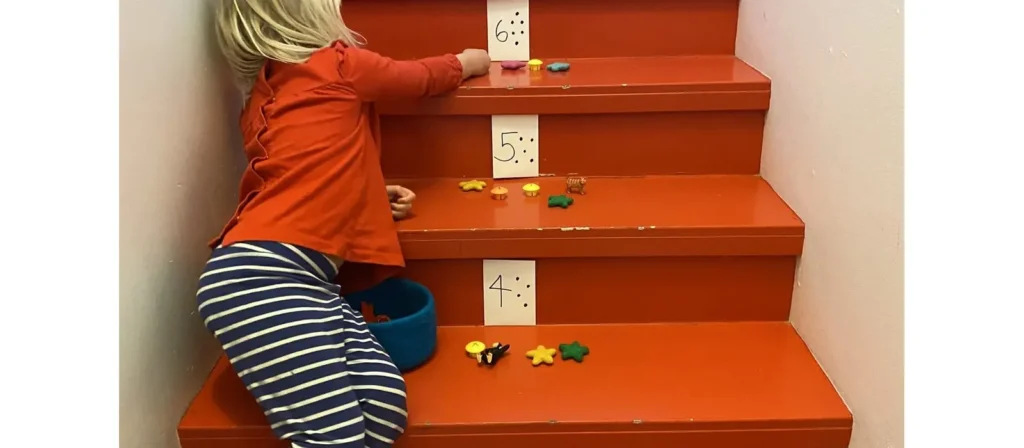
Educational Value: This movement-based game reinforces number order, introduces forward and backward counting, and builds gross motor skills. Associating physical steps with numerical progression makes abstract concepts tangible for young learners.
37. Dot Sticker Number Match
Prepare sheets with numbers (1 to 10) and give your child a roll of colored dot stickers. Ask them to place the correct number of stickers under each numeral. They can use different colors for even and odd numbers for added learning.
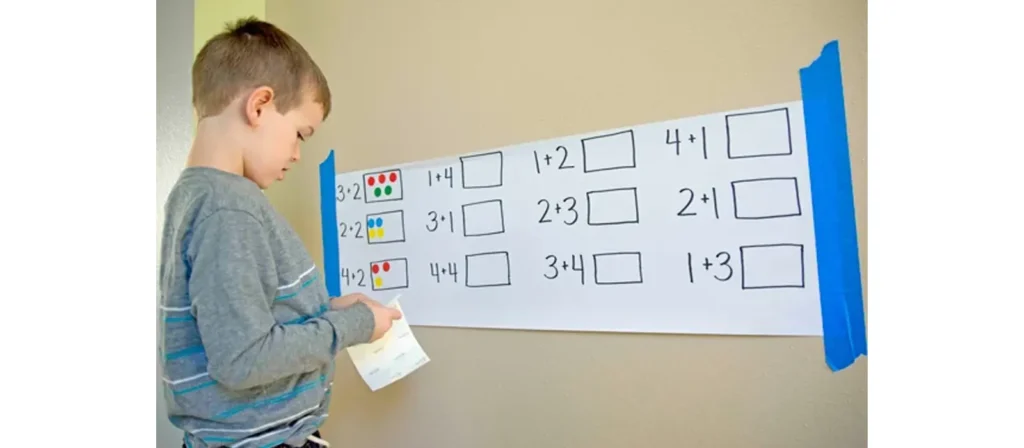
Educational Value: Matching dot quantities to numerals reinforces number recognition and counting. The visual and tactile interaction enhances memory retention, especially for visual and kinesthetic learners. It’s also an excellent quiet-time math task.
38. Shape Puzzles
Provide wooden or cardboard puzzles with basic geometric shapes (circle, square, triangle, rectangle, etc.). Please encourage your child to match each shape piece to its corresponding slot. As they complete the puzzle, ask them to name each shape, count the sides, and talk about where they see that shape in real life.
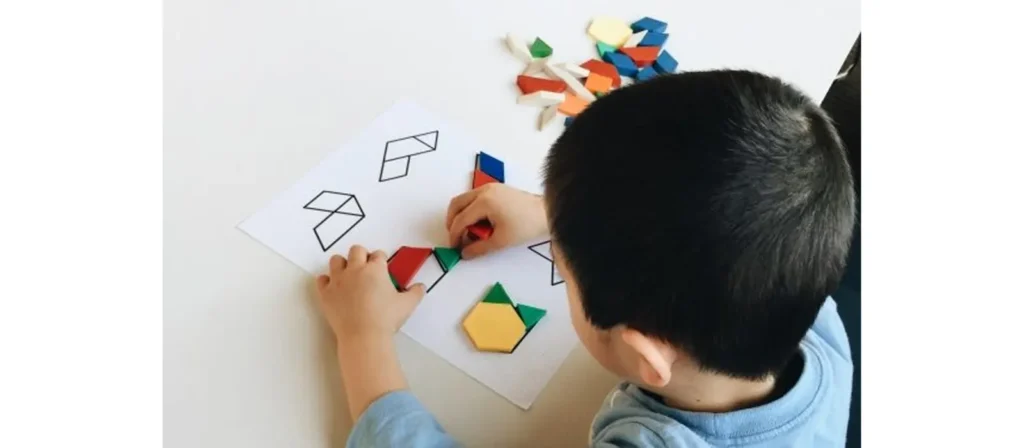
Educational Value: Shape puzzles build shape recognition, spatial awareness, and fine motor control. Children strengthen their understanding of basic geometry by identifying and manipulating different geometric forms while improving their problem-solving abilities.
39. Calendar Counting
Hang an extensive calendar at eye level and use stickers or markers to mark off each day. Begin the day by asking your child to count how many days have passed in the month and how many remain. Incorporate pattern stickers for weekends or holidays, and ask them to find specific dates (e.g., “What day is the 10th?”).
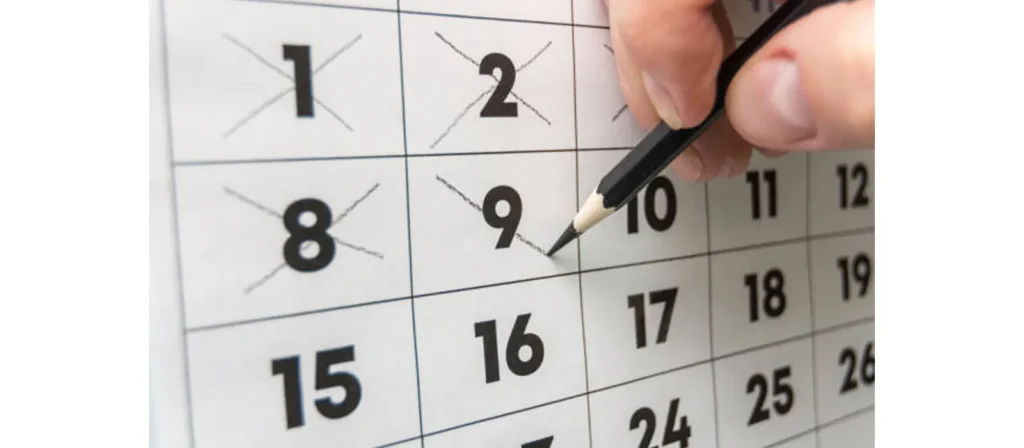
Educational Value: This daily routine helps children understand number sequencing, date recognition, and early concepts of time. It builds awareness of days, weeks, and months, while reinforcing ordinal numbers and basic counting skills in a meaningful context.
40. Shape and Number Tracing
Print or draw simple tracing sheets with large numbers (1–10) and basic shapes. Give your child crayons, markers, or finger paints to trace over each figure. You can laminate the sheets for reuse with dry-erase markers. Reinforce by saying the name of each number and shape aloud.
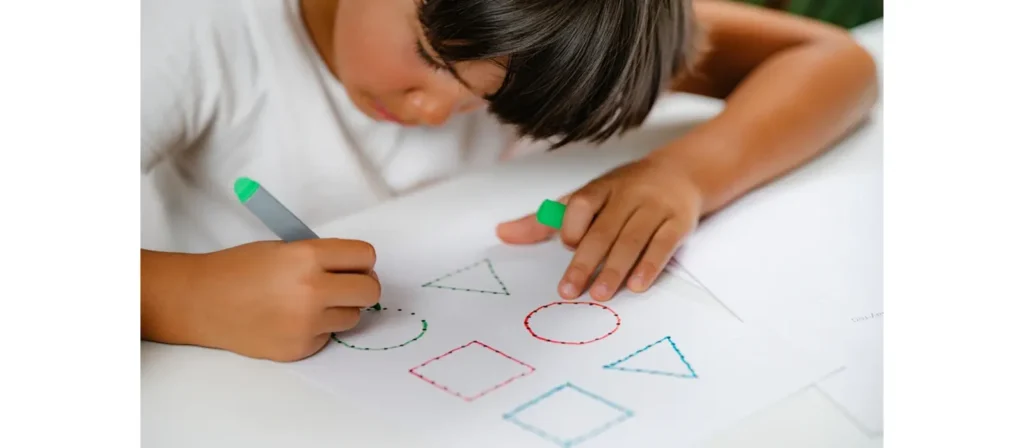
Educational Value: Tracing supports visual recognition and muscle memory, laying the foundation for handwriting and numeric literacy. It reinforces shape identification and number formation while promoting fine motor development and concentration.
41. Number Bowling
Set up 10 empty plastic bottles and label each with a number from 1 to 10. Have your child roll a soft ball to knock them down. After each roll, they count how many bottles fell and identify the numbers they knocked over. Older preschoolers can try adding the total of the fallen pins.
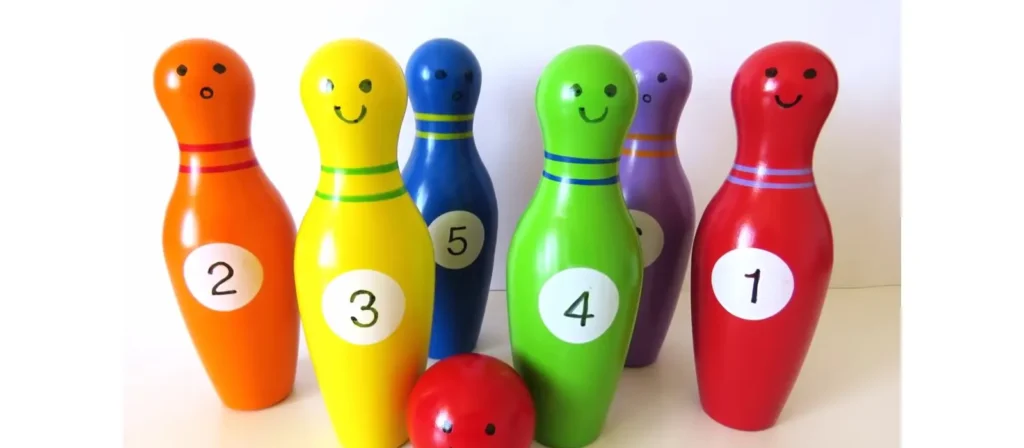
Educational Value: This fun game strengthens number recognition, counting, and addition. It also introduces physical estimation and motor control, making it a highly engaging way to reinforce numerical skills through play.
42. Dice Race Game
Use paper or floor tape to set up a number line from 1 to 10. Children roll a die and move a small toy or animal forward along the number line based on the number rolled. First to reach the end wins. Add a second die to introduce simple addition or subtraction challenges.
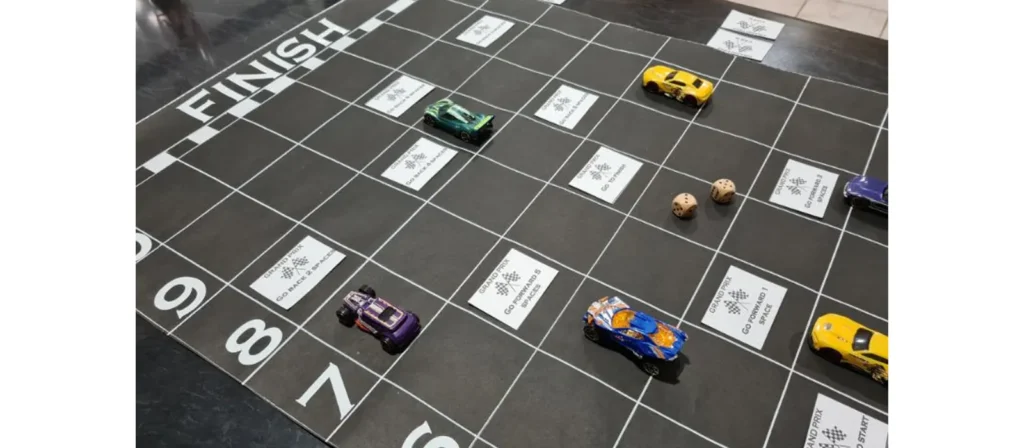
Educational Value: This game strengthens one-to-one correspondence, counting-on, and numerical comparison. It introduces the concept of linear progression on a number line, laying the groundwork for future operations like addition and subtraction.
43. Paper Chain Counting
Give your child colored paper strips, glue, or a stapler to create chains. Ask them to make a paper chain with a specific number of links (e.g., “Let’s make a chain with 7 rings”). You can use different colors for odd and even numbers or make multiple chains and compare lengths.
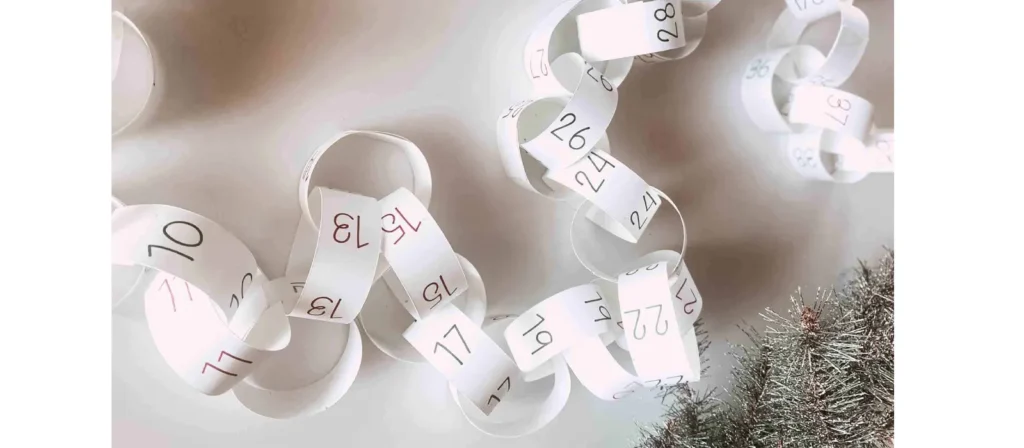
Educational Value: Creating paper chains develops counting skills, fine motor coordination, and understanding quantity. When children adjust the number of links, they introduce patterns, sequencing, and basic addition or subtraction.
44. Math Detective Mystery
Set the stage with a playful mystery like “The Case of the Missing Number 7.” Children become math detectives, solving clues to find the missing number. Each clue involves a mini-math challenge—counting objects, solving a simple pattern, or following a number trail—to advance to the next stage.
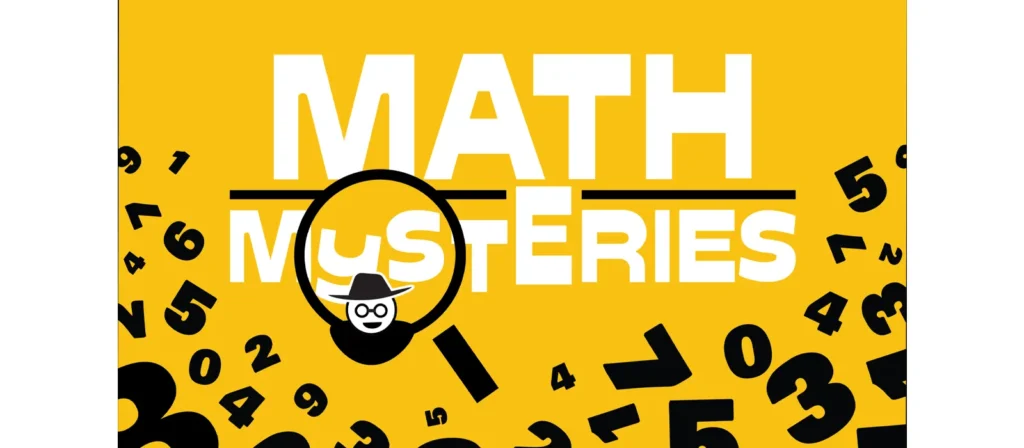
Educational Value: This adventure-based activity fosters logical reasoning, problem-solving, and sequencing. Children reinforce their counting and pattern skills in an immersive, story-driven format that encourages critical thinking and language use.
45. Math Yoga
Create math-inspired yoga cards or poses: “Triangle pose” (make a triangle with your arms and legs), “Count to 5 while holding a stretch,” or “Balance like the number 1.” Children follow along with movement cues tied to numbers or shapes.
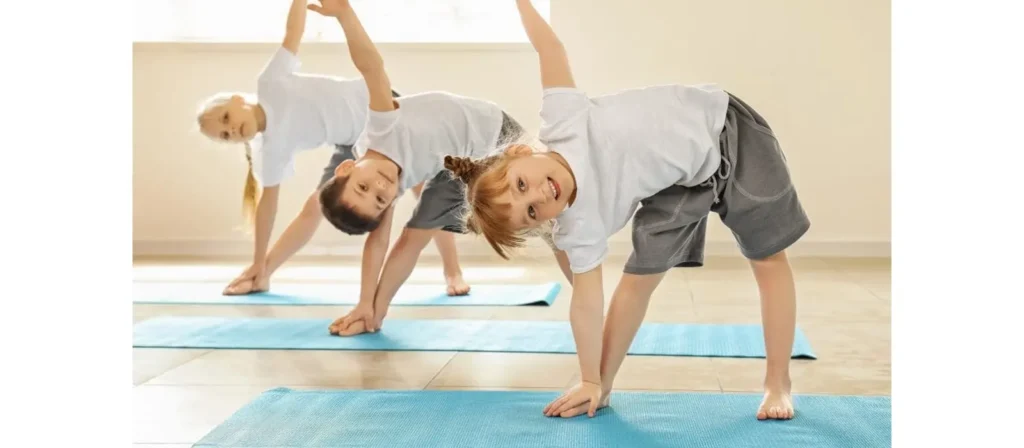
Educational Value: Math Yoga links physical activity with number recognition and shape concepts. It supports body awareness, gross motor development, and memorization through multisensory engagement—ideal for kinesthetic learners.
46. Number Line Hop
Create a large number line on the floor using tape or paper strips, labeled from 1 to 10 (or higher). Call out a number and have the child hop to it. You can add challenges like “Hop 2 numbers forward from 3” or “Jump to the number that’s one less than 6.”
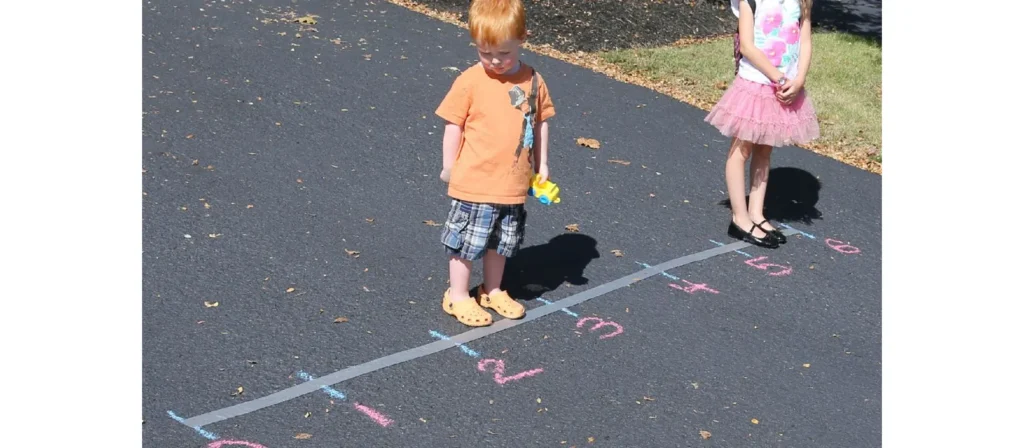
Educational Value: This kinesthetic game reinforces number recognition, sequencing, and early addition/subtraction. It helps children understand numerical order and relative position using their bodies.
47. Estimation Walk
Take a walk indoors or outdoors. Pause at certain points and ask the child to guess how many steps it will take to reach a specific object (e.g., a tree or wall). After guessing, have them walk and count their actual steps to compare.
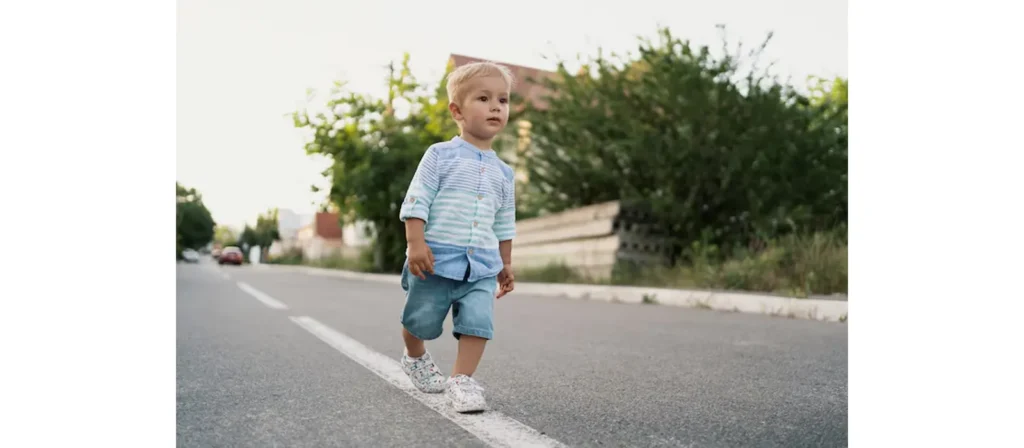
Educational Value: This encourages estimation, number comparison, and reflective thinking. It also helps children develop a sense of scale and quantity using their own bodies as measuring tools.
Don’t just dream it, design it! Let’s chat about your custom furniture needs!
48. Pipe Cleaner Counters
Provide children with pipe cleaners and a bowl of colorful pony beads. Label a tray or worksheet with numbers 1 through 10. Children slide the correct number of beads onto each pipe cleaner to match the numbers shown. You can also create simple addition cards (e.g., “3 + 2 = ?”) and have them show the answer with beads.
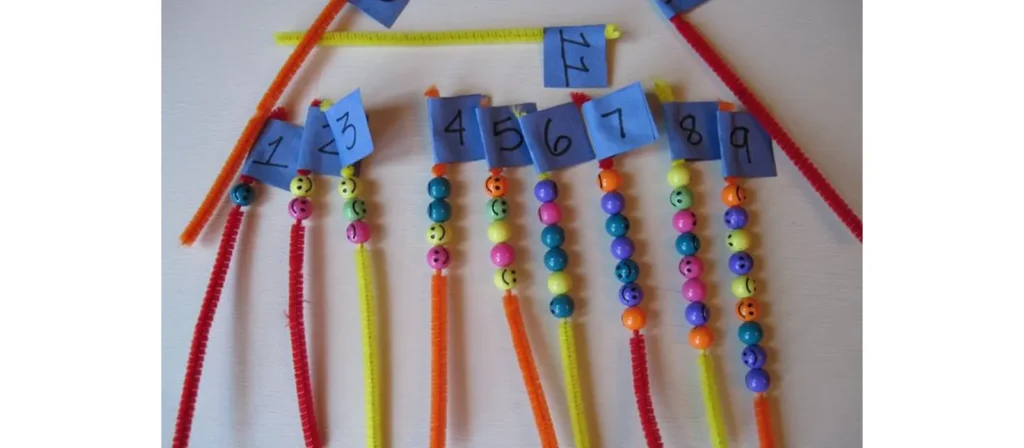
Educational Value:
This activity enhances fine motor skills while teaching one-to-one correspondence and number recognition. It introduces early addition and subtraction in a tactile way, perfect for visual and kinesthetic learners.
49. Digging for Numbers
Fill a sensory bin with sand or rice and hide number cards or plastic number toys inside. Give children small shovels, scoops, or their hands to dig and find the numbers. Once a number is found, they must identify it and either count out that many objects or perform a task (e.g., jump 6 times).
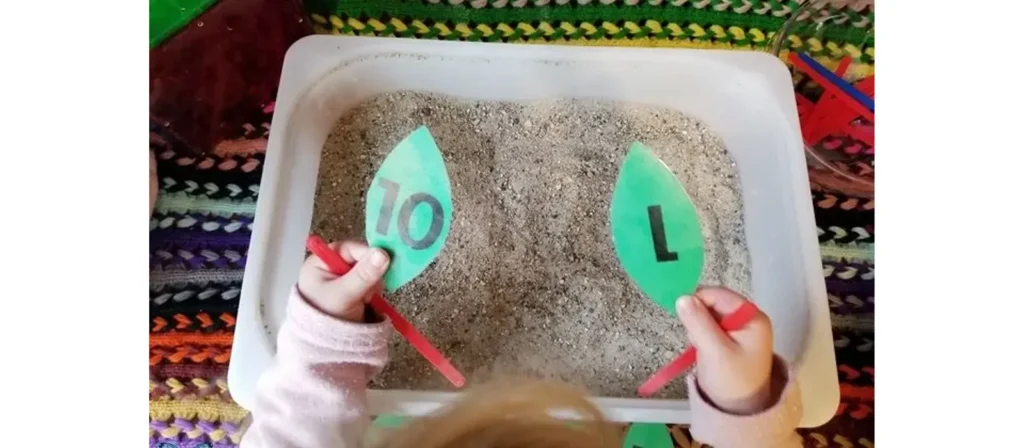
Educational Value: This sensory-based game builds number recognition, counting, and fine motor coordination. It also enhances engagement and curiosity, making learning feel like an adventure. Children reinforce quantity concepts through active exploration.
50. Swat That Number
Tape number cards (1–10 or higher) on a wall or floor. Call out a number and have children use a clean fly swatter to “swat” the correct one as quickly as possible. For an added challenge, give math problems like “What is 2 + 3?” and have them swat the answer.
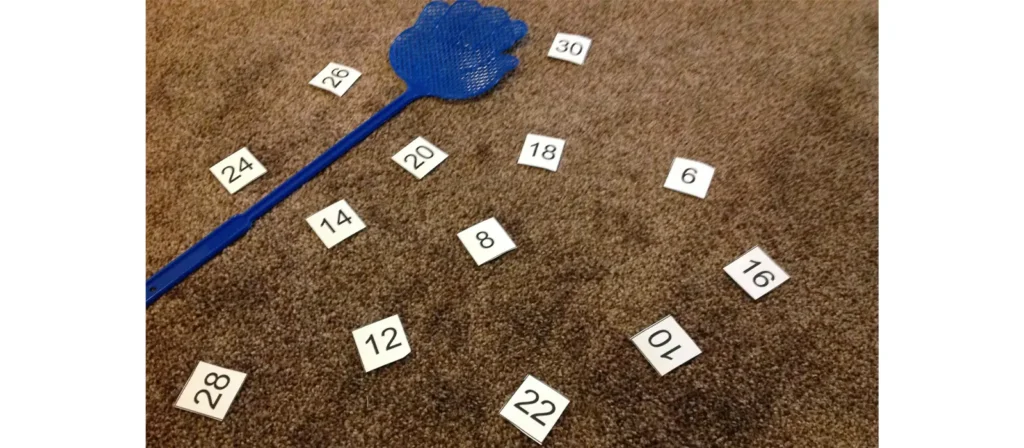
Educational Value: This fast-paced game improves quick number recognition, response time, and mental math skills. It’s especially helpful for practicing addition facts and listening comprehension while offering a burst of energetic fun.
51. Hungry Monsters
Create monster faces out of paper bags or cardboard boxes with mouths cut out. Label each monster with a number. Provide small items (buttons, pom-poms, coins, cards) and ask children to “feed” each monster the correct number of items or shape according to the label.
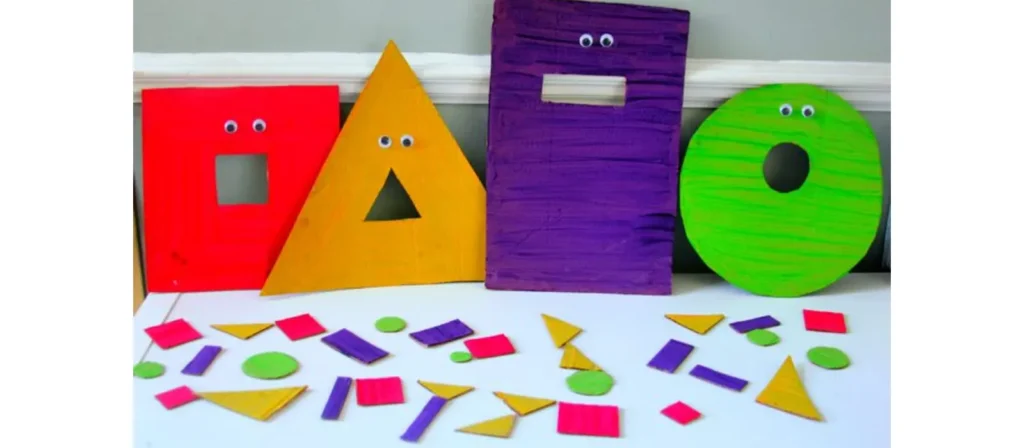
Educational Value: This imaginative role-play activity reinforces counting, number recognition, and one-to-one correspondence. It taps into creativity and storytelling while supporting math skills through repeated hands-on practice.
52. Uno Number Match-Up
Use a deck of UNO cards and spread them face-up on a table. Children draw a number from a separate stack (or use a die), then find and match it to the same number in the UNO cards. You can also play memory style—flip two cards and try to find matches by number or color.
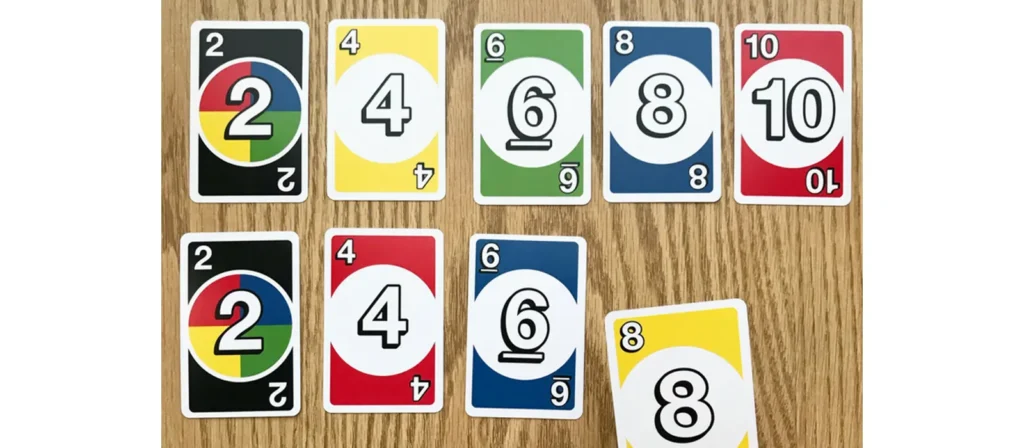
Educational Value: This game builds number recognition, matching, and visual scanning. It also encourages turn-taking and game strategy, adding a social element to learning. Using familiar game cards makes the experience both educational and engaging.
Toys for Math Activities
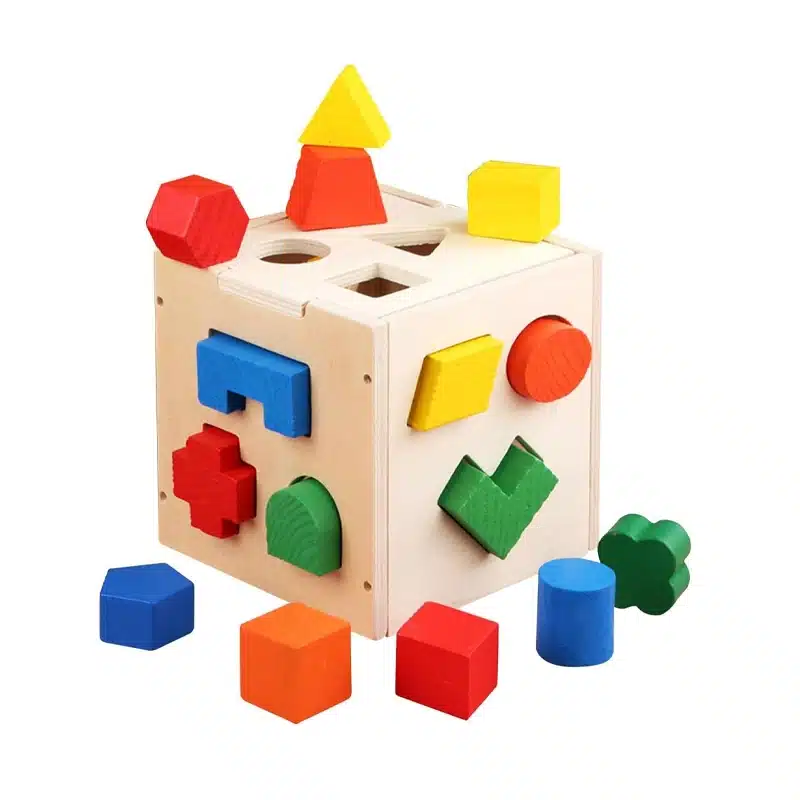
The Wooden Toys Shape Sorter is a versatile and engaging educational toy designed to help young children learn about shapes, colors, and spatial awareness. This toy typically features a set of colorful, wooden blocks or pieces that can be placed into corresponding cut-out shapes on a wooden base, encouraging children to match the right shapes to the right slots. This toy is ideal for young learners who are beginning to explore the world of geometry, as well as those looking to enhance their fine motor skills and visual perception. It provides a hands-on way to learn about shape properties and basic geometry concepts in a fun, interactive manner.
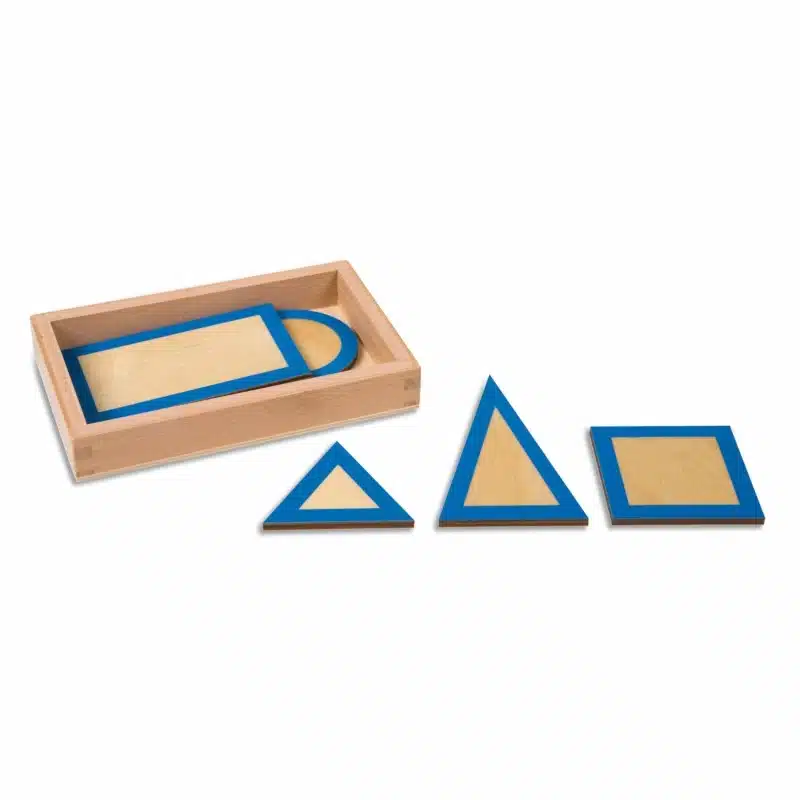
The Geometric Plane Figures with Box is an educational toy designed to help children understand basic geometric shapes and improve their spatial reasoning skills. This set typically includes a variety of flat, colorful shapes such as circles, squares, triangles, rectangles, and more, all contained within a sturdy box for easy storage and organization. Helps children identify and categorize different shapes, which is an important foundation for math activities for preschoolers.
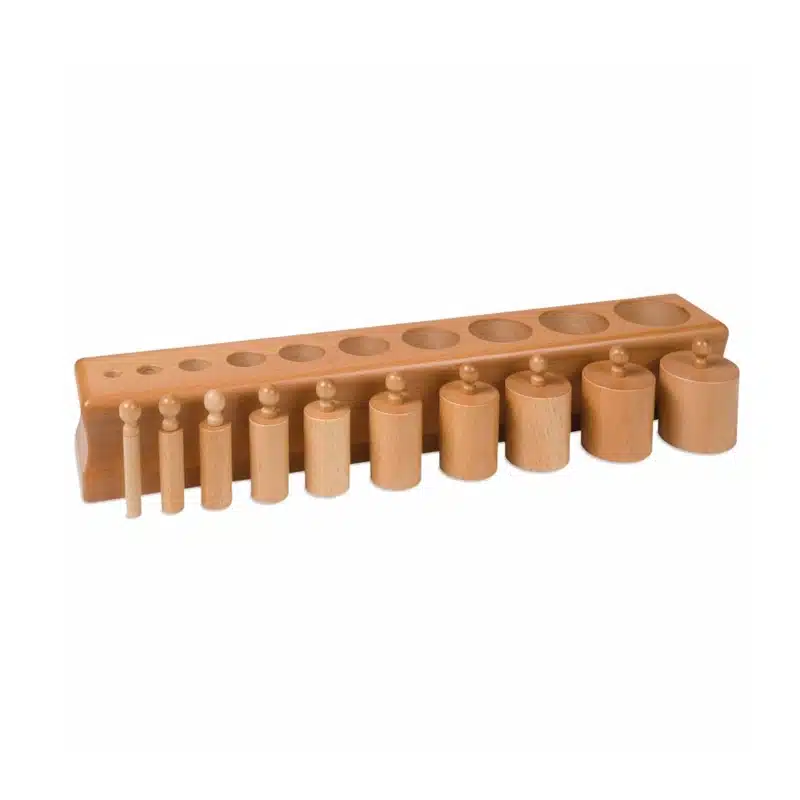
The Wooden Weights is an educational toy designed to introduce children to basic concepts of weight, measurement, and balance. The Wooden Weights set is a great tool for teaching young learners about the principles of physics in an engaging and interactive way. It is especially suitable for early education settings or home learning, helping children develop both cognitive and motor skills while exploring basic concepts of weight, measurement, and balance.
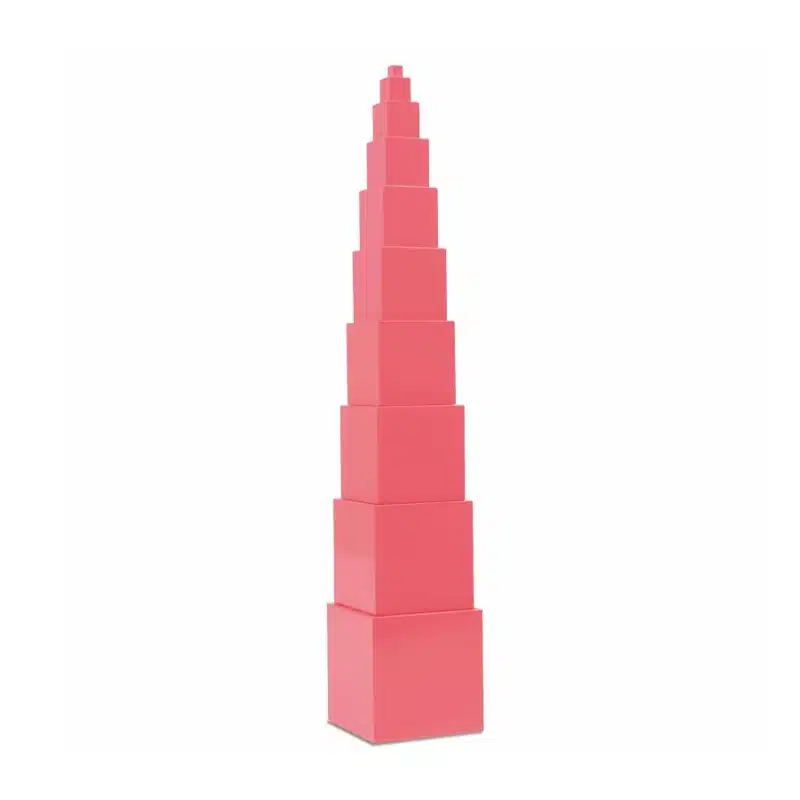
The Pink Tower is a classic Montessori educational toy designed to help children develop their understanding of size, order, and spatial relationships. The toy consists of a set of ten pink cubes, each progressively larger than the previous one. These cubes are typically made of wood and are designed to be stacked in order of size, providing a hands-on experience to explore concepts of comparison, volume, and sequencing.
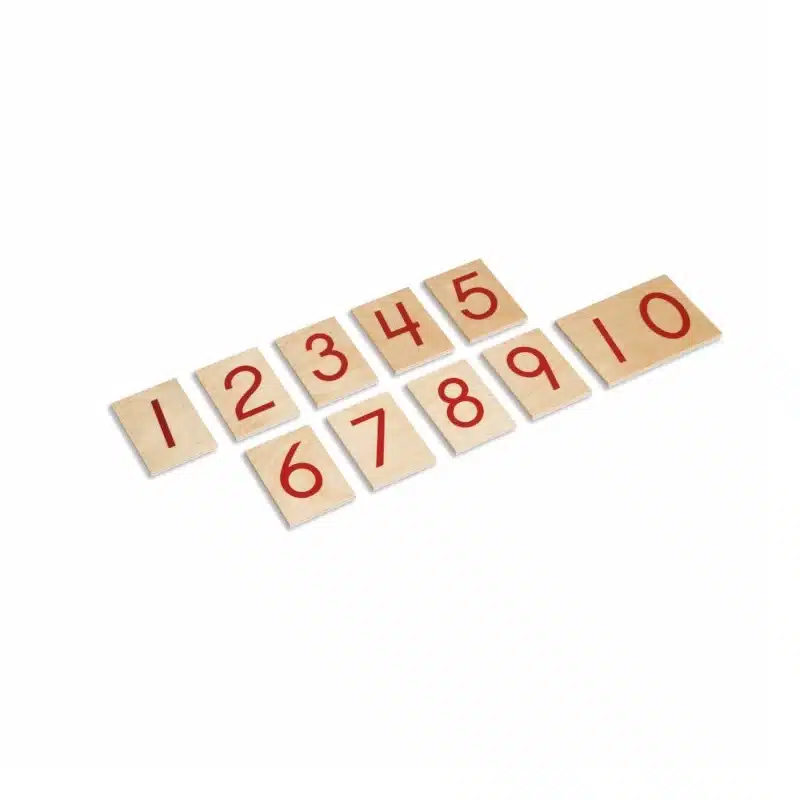
Printed Numerals are ideal for preschoolers and early learners who are just starting to explore numbers. This toy can be used in various activities such as matching games, number tracing, or counting exercises to support the development of math skills. It’s a great addition to any early learning toolkit, helping children build a solid understanding of numbers playfully and engagingly. The toy helps children learn to identify and name numbers, fostering early numeracy skills, and is great for math activities for preschoolers.

Math Bingo is an exciting and interactive educational game designed to help children practice and reinforce their math skills in a fun, engaging way. It combines the classic game of Bingo with math problems, making learning both enjoyable and effective. It is an ideal tool for making math practice more enjoyable and interactive, whether at home or in the classroom. It encourages children to learn and apply math skills while having fun with their peers!
Your perfect classroom is one click away!
Tips for Parents and Teachers on Guiding Math Activities
Engaging preschoolers in math doesn’t require expensive tools or advanced knowledge—just curiosity, patience, and a bit of creativity. Whether you’re a parent at home or a teacher in the classroom, your role as a facilitator is key to making math meaningful, fun, and part of everyday life.
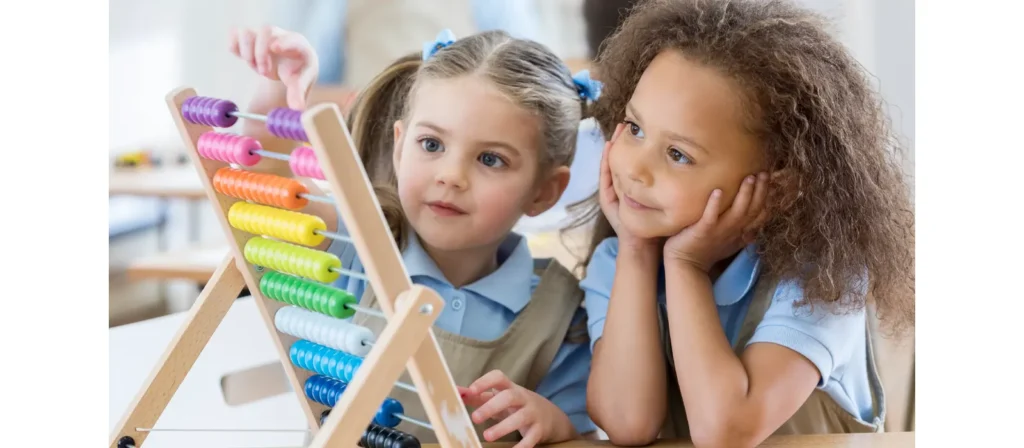
Create a Positive Math Environment
Embed math into daily routines to make it feel natural and approachable. Count stairs as you climb, measure ingredients while cooking, or sort laundry by size and color. Celebrate effort, not just correct answers, to build confidence and reduce fear of mistakes.
Use Open-Ended Questions
Ask guiding questions that promote thinking and reasoning rather than seeking a “right” answer. For example:
- “What do you notice about these blocks?”
- “Can we sort these by shape or size?”
- “What would happen if we added one more?”
These prompts invite exploration and help children develop problem-solving skills.
Incorporate Movement and Play
Young children learn best through active play. Incorporate movement whenever possible—hopping while counting, walking number lines, or building physical patterns. Games that involve gross motor skills can reinforce concepts like counting, sequencing, and comparisons.
Model Mathematical Thinking
Think aloud during everyday tasks to demonstrate your thought process. For example, say: “I have two apples and I want to give one to you. How many do I have left?” This models logical thinking and helps children internalize how math works in real-life contexts.
Respect Developmental Stages
Understand that young learners develop math skills at different rates. Some may count to 20 but struggle to understand quantity; others may grasp patterns but not shapes. Offer varied activities and avoid rushing into formal instruction. Focus on understanding over memorization.
Use Real Objects and Visuals
Manipulatives like buttons, beads, blocks, and food items help make abstract math concepts tangible. Use visuals such as charts, storybooks, or pictographs to support different learning styles and reinforce connections between numbers and real-world meaning.
Be Consistent and Patient
Repetition builds mastery. Don’t be afraid to revisit familiar games or tasks with slight variations. Celebrate small wins and let the child set the pace. Avoid pressure or over-correction, which can hinder motivation and confidence.
Encourage Language and Expression
Let children describe what they’re doing. Ask them to explain their thinking, even if the answer is incorrect. This builds mathematical vocabulary and metacognition—the ability to think about their own thinking.
Make It Fun and Meaningful
Above all, ensure that math activities are playful and purpose-driven. The goal is not just to teach numbers, but to spark joy in exploring patterns, puzzles, and problems. The more children enjoy math now, the more confident they’ll be as they grow.
Conclusion
Engaging preschoolers in math activities offers far more than just an introduction to numbers and shapes; it lays the foundation for critical cognitive, social, and emotional development. Children build early math skills and enhance their memory, logical thinking, and creativity through playful yet purposeful activities like counting, sorting, measuring, and problem-solving. These activities foster confidence, teamwork, and perseverance, setting the stage for future academic success.
By making math fun and interactive, we help preschoolers develop a strong sense of curiosity and a positive attitude toward learning, key ingredients for lifelong success. Whether through simple games, outdoor exploration, or hands-on toys, math activities engage children in a world of discovery, providing them with the essential tools to understand and navigate the world around them. By incorporating these activities into their daily routine, parents and educators can ensure that math becomes an exciting and integral part of their early learning journey.



